#enjoy the analysis
Explore tagged Tumblr posts
Text
@materialistteacher

Why are my friends like this
6K notes
·
View notes
Text

It's crazy how Dungeon Meshi's manga can feel more cinematic and emotional than the anime to me, even when they're practically the same. Compared to the anime, this moment is such a heartbreaking gut-drop. The way Kui uses negative space and flat compositions to create a sense of horrific stillness is so key.
The way the text (Senshi's monologue) is sequestered to an empty corner of a panel or huddled away from the edge of its text box is not only a great way of showing Senshi's headspace (fearful, isolated, dissociating), but creates a visual representation of pause, as if you hold your breathe after each line. The first panel puts us directly in Senshi's perspective too (compared to in the anime, which puts us as an outside observer over Senshi's shoulder). The detail of the door and bricks so effectively implies that he stared at it for so long, waiting and hoping, that its image is burned in his memory. The wood grain, the brick arch, the number of rivets. The lack of dialogue in the second panel shows a moment of realization too –– "he's dead" (also a great example of the Kuleshov effect). And it's that pause that creates a beat and sets a great rhythm to his headspace, like a music rest: "He never came back." (oh god.) "I'm all alone." Finally, the third panel's negative space, cropping Senshi, shows how truly alone he feels. Without his family, the world ceases to exists. Under shock, he traps himself in a 1-foot radius, too scared to even perceive a world outside its boundaries; a world that can hurt him, kill him, make him disappear with it. There is only his body, the stone beneath his feet and against his back, his thoughts, and that awful bowl of soup.
Even though they're a series of flat images, there's an implicit reading of silence in Senshi's realization and horror. Kui influences your experience to slow down and take your time.
Compare this to the anime, which fills every shot with dialogue. The pacing is fast; we never get to sit in silence like we do with the manga. The horizontal frame allowed the boarders to add Senshi, turning the composition into an over-the-shoulder shot, which takes us out of Senshi's POV. They also added a zoom-out in shot one, which adds unnecessary energy to a very somber scene. The tightening on Senshi as a close-up reaction shot also dulls the moment. In the original panel, Senshi stares ahead at the empty space to his left as a shadow surrounds his mind. It not only shows how Senshi's senses are dulling and his world is shrinking (setting up panel three), but shows how terrified Senshi is of what's in front of him, how the air itself becomes pitch black and opaque, how Senshi is surrendering himself to fear. The pacing is understandable and necessary; this episode packed a lot of story content together. It's just a shame because it really (imo) deflated one of the most nauseating moments in Dungeon Meshi.
#dungeon meshi#senshi#analysis#personal#long post#not art#because comics are inherently more abstract and rule-breaky the format thrives off show don't tell#i think trigger is doing a great job overall but they missed the mark on this scene#for me cinematic storytelling will prioritize rhythm; tension; and silence over plot. that's why the manga feels more “cinematic”#if you've been enjoying the anime i cannot recommend also reading the manga enough. it's a completely different experience with much more#subtext and emotion to draw from
4K notes
·
View notes
Text
I think, Sebastian genuinely believes that his mind is unchanged from the experimentation. At least, besides the PTSD.

But we can see through his actions/writing that he has a bit of an inhuman penchant for violence. Especially for someone who.. didn't kill 9 people when he was 20, and was overall a pretty average guy!
It's weird to shoot somebody dead after them inflicting 2 mind numbing headaches via beacon. He could just kick them out of the shop! I think unconsciously, his predator instincts drive him towards hurting people. He's still a person mentally, but what he's ok with doing has been augmented.
It just feels so natural to hurt and kill these people who have done him so wrong in the moment that he is not going to reflect on why he does it until much much later. Even if he knows that Urbanshade employees get revived, only ONE of the Expendables does in-canon. He's sending these people to a permanent grave.
He's always been thankful that he managed to keep his mind/sanity through the experimentation, so the thought that he did lose just a tiny bit of himself wouldn't cross his mind until he's potentially cured in a good ending. He'd be oddly more relaxed in a way that's hard to pinpoint, he knows he's going to be relaxed for the obvious reasons, but there's that tiny little feeling there that Something is missing.. so he has to come to terms with the fact that Urbanshade affected his mind too.
He didn't start out as a killer, but he's been forced into the role, through experimentation, and the need to survive.
#sebastian solace#sebthoughts#my new tag#this isnt something in the game but fanart of him getting bloody + evil being strongly encouraged by devs also feeds into my analysis here#i know that the expendables are all like hardened criminals who suck ass but like i still think it's weird for him to commit murder here#NOT IN A “I THINK HE'S WRITTEN BAD” I'M ANALYZING HIS CHARACTER MOTIVATIONS!!!!!!!!! I LOVE HIS WRITING#a lot of my character analysis i feel ppl might think im just saying the obvious but i know i have some ppl who enjoy reading so. smiles#data.txt
480 notes
·
View notes
Text
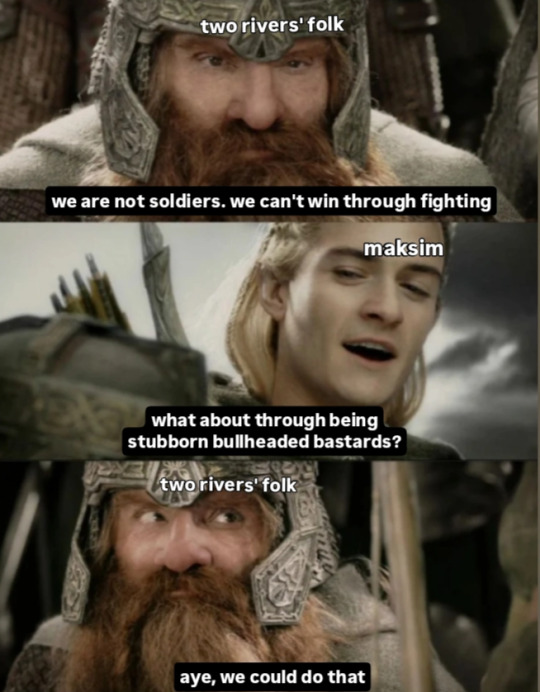
holding the pass
#the reason i cant produce intelligent analysis of the episodes is that THIS is what my brain thinks about while i'm watching#really enjoyed maksim rallying the villagers to make a desperate stand by calling on their famed whoolheaded stubborness#wot on prime#wheel of time#wot meme#wheel of time memes#wot show#wot 3×07
591 notes
·
View notes
Text
Ena in Dream BBQ and Work Culture

HELLO Dashboard!! Ever since i first played DBBQ i've found the entire game endlessly interesting (as have most people, LOL) But one of the most interesting, and in my opinion, most Potent things, is Ena's character and how she relates to the game's commentary on modern work culture.
So for anyone as much of a #SICKO as me 😭 Here's an embarrassingly long analysis of just that! There's SO much to talk about with this game, and even when I'm trying to focus on one specific idea with this post, I'm sure I'll still miss things, so just stick with me best you can OK? 😭 😭
My aim for this post is to allow you to understand Just how deep in the torment nexus Ena is, and to want to say "she should be at the club" Only to realize she can't even go to the club. She can't even go to the club. Because of Job. (Among other, hopefully more intelligently articulated things!)
SO, Let's just jump right in :D
First, to state the obvious—Ena's literal entire life is her job. The only moods she expresses under normal circumstance are "smooth talking salesperson where every line is about working or trying to sell something" and "Stops keeping up the veneer and gets frustrated and pissed because she hates her stupid job."
This permeates every aspect of her character—I don't think there's a single line in the game so far where she says like, Anything about herself. There's nothing about what she may want or what she may like. It's all about her fuckass job or the fuckass Boss.
And of course, even in gameplay aspects, you literally don't get a chance to choose whether you accept a job or not, like the thought of doing anything besides giving her time and energy for other people or her job's benefit doesn't even occur to her (Or, it can't occur to her—I doubt the Boss would want to allow her reprieve from anything at all, and I'm sure Ena would know this).
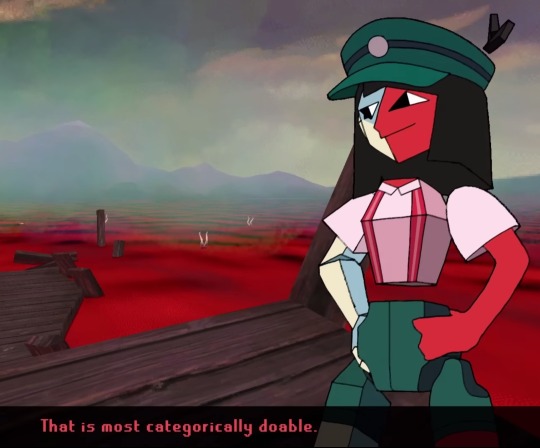
(^ Ena's reaction to being told to find a mythical figure that she maybe didn't even know existed cause Froggy sure as hell didn't to do a stupid job for Froggy's stupid ass. Like)
Maybe i'm reaching here, but I even find it interesting how her red hand has no fingers (besides a thumb). I feel like that represents a lack of individuality she has when she's in Salesperson mode, or at least, a lack of individuality she's been allowed. A lack of having a defined being cause it's all about this stupid job.
There's lots of avenues to go from here, but let's start with another big point of the game: Everybody hates her. Except for like, three characters, every NPC in the game either insults her, talks down to her, blatantly doesn't respect her, or Literally tells her nobody should be punished for being born except her. Typical day for Ena.
I'm not going to get into why I think this is—for me there's not enough evidence to speculate with surety right now—but I think this does tie strongly into her commitment to her job. Ena working her ass off in every aspect of her life and earning nothing but disrespect for it is very reminiscent of real life work environments.
Think of how almost every NPC claims they are "the Boss" in such a way that many of them seem to want to be the Boss, like he's some kind of well-known or respected figure. The description for the game on Steam even says as much: "Play as ENA as she searches for the Boss that everyone wants to be."
(eg: "I am the B-O-S-S!"):
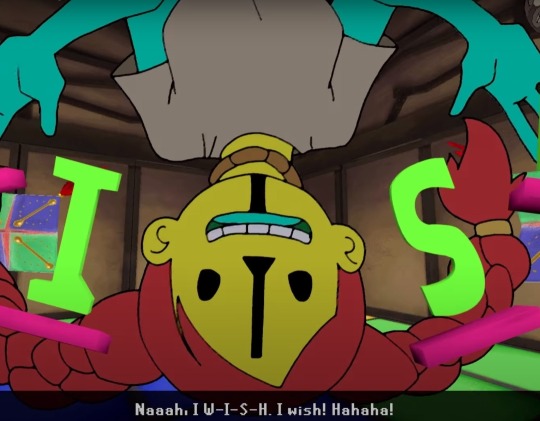
People wish they were the Boss, they want to be some kind of rich capitalist with power and fame, but when looking at someone who actually works for him, and probably is the reason the Boss has profit and success in the first place, they insult her and demean her no matter how much she gives herself to them and the Boss. I'm sure you can see the real life parallels here.
It's even possible one of the reasons Ena works so hard in the first place is as an attempt to earn respect from these people, or to make up for whatever everyone thinks she did that made everyone hate her so much. Especially considering...
Our society is one that tells its people that Work is unequivocally Good. Committing yourself to work is what everyone, no matter who they are or what they face, is what you have to do to be a valuable member of society, and to have any respect from other people in the slightest. It tells its people that you only have value as a living human being at all if you give your life to work.
Even though this blatantly isn't true. If people think you're the Wrong type of worker, or if people think your work isn't valuable, helpful, or that it doesn't require skill, you can work as hard as you want but you'll still be treated like shit. But, hey, work is still your duty as a member of society, right? Stop bitching and whining and pull yourself up by your bootstraps, right?
Needless to say, it's easy to see how this whole idea is being represented in DBBQ. She even knows how much she's sold herself to this, she just... Seems to have extremely casually accepted it all LOL, which, I mean... What else does she have the power to do?
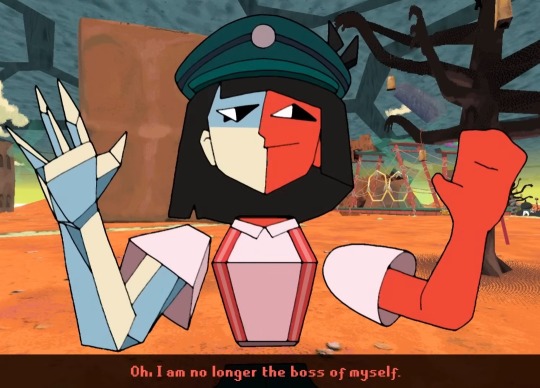
This very casual and nonchalant acknowledgement of her lack of autonomy connects to another big point: Ena doesn't value herself, nor does she even know how to exist without being in a constant state of working.
Let's talk about the Purge: There's a LOT to get to here in terms of Ena herself LOL, but the intrigue starts before she even enters the party. Literally Froggy just saying she's about to enter an "Event" stops her in her tracks and worries her. Not to mention the next line...

This feels like an indication that despite how much she commits herself to it, Ena does "crave freedom" from her shitty job, although she can scarcely admit this anywhere else so far. Then, if you talk to this slime guy, you get some strange text.
As far as I know, the text for interacting with things doesn't look like this anywhere else in the game. And given that it looks exactly the same as how Ena's lines do in the Purge, it's seemingly the only peek we get into her internal monologue, and it is. Quite worrying! She literally can climb up a hellish freezing floating mountain and yet this is by far the most freaked out she gets in the entire game.
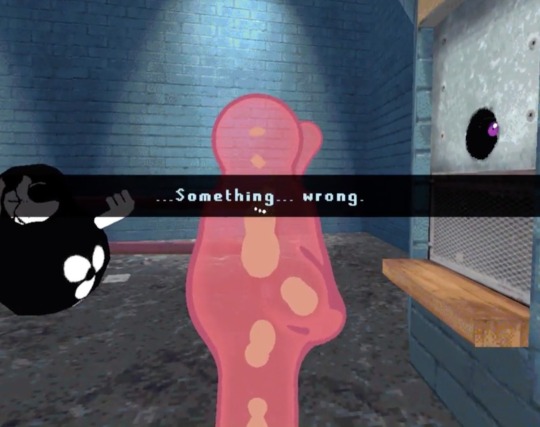
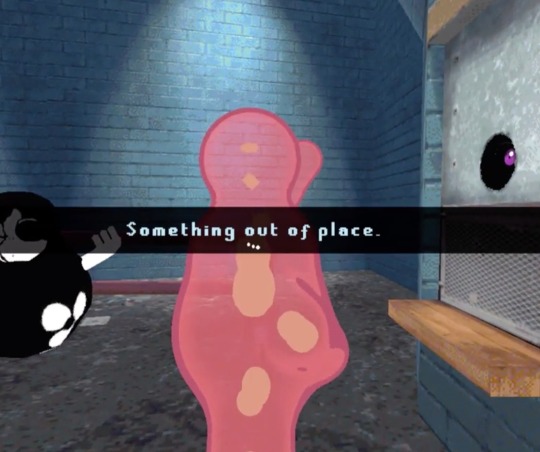
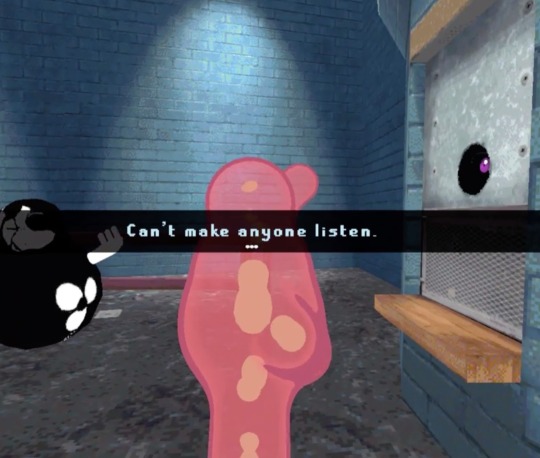
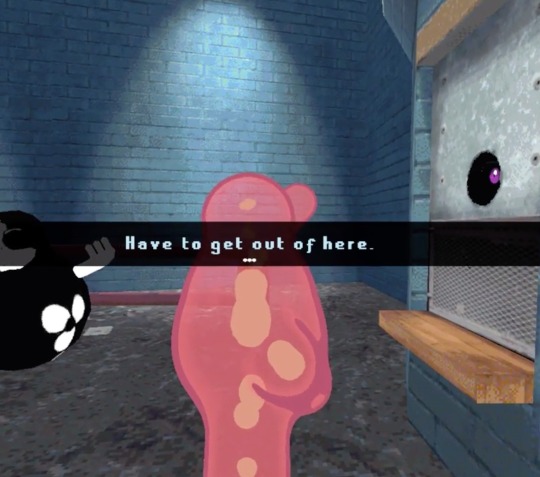
And then to actually get into the Purge, an Evil eye Ball tells her that she needs to give a literal arm or a leg to get in. And she just does it. Like no hesitation no further questions she just gives it away to the evil eye ball. Presumably for Good? Because the only reason she regains the arm later is because of Genie magic? Like Ena. Girl. Are we gonna talk about this at all.

But so many real life work environments expect you to give every part of yourself in order to be allowed to exist and live in society, including your physical being and critical parts of your personhood at all.
(Let me also say I find it intentional that she gave away her white arm. Whereas her red hand literally doesn't have fingers, the sharp claws she has on her white hand represent the individuality and unique identity she Does have. However, it's also the part of herself that's in conflict with her ability to be a Good Worker, that always does exactly what she's supposed to do, and never complains, and never gets in the way of her duties.)
She was already very distressed here, but it's a clear indication of how little she values herself. It was a motion to lose a part of herself just to reach the Genie, both for her stupid job, and possibly for the possibility of "freedom" from it all. And your average job these days—no matter how important you are to your cause—will drill it into you that your ability to be a good worker is infinitely more important than your existence as a person. It's easy to see how Ena may have internalized that.
And then she goes to the club one time and this happens

I won't get too deep into her dialogue with the NPCs here because I think their intention is pretty clear; Being in a place so antithetical to a work environment, and a place where she's supposed to let loose and have fun, is so distressing and impossible to even fathom for her that This Happens.
(see: "H-How can I leave this stupid event? M-my lame schedule is full,")

Like, everything at the Purge is insane, but this is a particularly heartbreaking line for me. One because of her job's shitty environment that's broken her down so much—do you think she EVER gets a break, because I sure don't—but also because of how it's conditioned her to not even believe she can "afford another minute of joy." Ena :[
Note how she's covered in these branches that started growing during Froggy's phone call, which look very similar to how she looks in this gag with the Shaman—it's literally her nervous system. In her scene with Mitu she even says she's feeling "sick," She's literally freaked out of her flipping Gourd with her goddamn Nerves On The Outside

Hell, even though Meanie's speaking (which, I mean, no shit, in another line she literally describes her job as "deplorable" 😭), these sprites in the files are actually labelled "Anxiety", suggesting that she's SO freaked out by being somewhere supposed to be so opposite to her work she's become another variant of herself, a la Drunk Ena from Season 1.
I won't get much more into this, because @cube-cumb3r has a PHENOMENAL post I'll link in the notes that goes deeper into this stuff from the Purge and the "Anxiety" thing, And also gets more into theory territory than I do here! Please please go read that post, it is so damn good.
In any case, I think the scenes with the Purge NPCs are the biggest examples in the whole game of how much she hates her fuckass job, yet she can't be allowed to be anything besides a wage slave to it. And just as she's internalized everybody in her world's dislike of her, she hates herself for it.

So:
We've established that Ena's shitty job parallels the real life work conditions that plague our world, and that these conditions have caused her to devalue herself and believe she can't have any reprieve from them... but, what even is her job?
Apparently she's a salesperson, but what is she even selling? She tries to offer a "divestment opportunity", and tells the Witches she can show them how to "grow [their] own [boss]" which definitely falls in line with the Sales thing, but besides that it's still not clear, even when she talks to Froggy.

I suppose the "grow their own boss" line does sound a lot like the phrasing used in MLM schemes, with how they lure people in by telling them they can "be their own boss." The Receptionist also calls Ena a scammer and a conman, so maybe she is a sort of scammer, but, I also don't exactly think the Receptionist think she has the most reliable opinions of Ena LOL
She also calls her a "pink-collar slug", pink collar meaning a job traditionally associated with women, which. ??? I don't fully know where to go with that.. like ...Nothing she does harkens to... Any kind of job expected to be done by women, imo?? Um. Yeah idk i just thought that may be significant??/ 😭😭😭😭 Listen man I can't know it all
Anyway. Maybe I'll be proven embarrassingly wrong when we receive more information in future chapters, but I think the lack of clarity on what she's supposed to be is representative of the games themes. The constant disrespect Ena receives makes her seem likely to be a low-tier worker, someone at the bottom of the ladder that people have no problems walking all over.
Because these types of jobs will treat you the same no matter who you are or what you're supposed to be doing. She's doing what the world tells her she needs to do in order to be a respected member of society, and yet she's also someone people feel comfortable treating poorly because she's at the bottom—because has no power of her own. It doesn't matter what she's supposed to be doing, it matters that she's the Wrong type of worker.
And how is she supposed to ever say anything for herself? It seems virtually baked into her Salesperson side to completely ignore past all the rude things these assholes say to her. After all, not only would that probably just make most people ruder to her (and impede her ability to complete jobs for them) isn't the customer always right?
...OK I will say her whole "Understood! Aim for the target!" line DOES seem like her overall job here is to fucking kill the Boss, but this is long enough already and the likely theme of Ena having a violent streak and whatnot is another beast entirely that I am NOT getting into here 😭😭
Besides, maybe she has no clearly defined job because we've already seen exactly what it is. To sell her life, time, and emotions to whatever all these clowns ask of her, and to receive no reward besides another goddamn job to do.
I think future chapters may delve more into Ena's true feelings on her situation, and possibly even how she'll get freedom from it. Allow me to mention the scenes with Theodora, wherein if you try to "aspire to receive a blissful life" Theodora just tells Ena "You can't aspire for more than what you are capable of." (LIKE OKAYYYY.... RUDE MUCH????)
Until, finally:


How is her mind—containing a desire for freedom—supposed to be in harmony with the letters it spits out, when she's been so conditioned that the only thing she's allowed to be is a worker?
Now, even I still have a lot of questions after this. Like: What has happened in Ena's past that made her this way? How and why did she take this job in the first place? What is up with the "Guys wait, I'm not doing what you say I'm doing" scene I literally didn't even mention that once here. Why should nobody be punished for being born except poor damn Ena, and does it relate to any of the themes I just talked about?
I... don't know. Like I actually truly have no idea. But I have confidence, even if it's in a delightfully vague and abstract Ena-typical way, that we'll find out eventually.
#ena dream bbq#ena#ena joel g#dream bbq#analysis#dbbq#ena dream bbq analysis#ena dbbq#calli.txt#WIPES SWEAT OFF FOREHEAD.#FINALLY. IM FREE#If i left any typos in here besides any proofreads. Im so sorry 😭#AND I HOPE EVERYTHING IM SAYING HERE ISNT AS. OBVIOUS AND SURFACE LEVEL AS I FEEL LIKE IT IS AT THIS POINT#BUT NO MATTER THE CASE. Well . I had fun :]#i hope you enjoy my funny words + PLEASE FEEL FREE TO TELL ME YOUR THOUGHTS ON THEM PLEASEEE ^_^#In conclusion:#She should be at the club. But she cant. She cant even go to the club.#My poor dear enaur :[#dream bbq spoilers
534 notes
·
View notes
Text
Are they queer? (Batman version)
Dick Grayson: Yes, in a video game (and also probably in the New52) which is good enough for me!
Jason Todd: Judd Winick certainly thinks so. And he flirts with guys.
Tim Drake: YES!
Damian Wayne: Well, no one's proved he isn't. (I couldn't find any evidence that he is though, so he goes in the "probably not" column.)
Stephanie Brown: Implied* to have dated Cass in Future State. Was a lesbian in the Gotham Knights TV show.
Cassandra Cain: Implied* to have dated Steph in Future State. Appears to express attraction to Zatanna and flirted with Harper. Signs point to yes.
Barbara Gordon: According to TVTropes Gail Simone said that a line in Birds of Prey originally had Barbara say she was "75% heterosexual" and this was only scrapped by accident so... TVTropes lied, this was about Dinah.
Harper Row: YES!
Kate Kane: YES!
Alfred Pennyworth: He married a guy in the Gotham High graphic novel! He's also a thespian (I say as a theater kid).
Duke Thomas: Probably not.
Bruce Wayne: He did look like he was about to kiss a guy (possibly Ghostmaker) in The Knight #5. And George Clooney said he played him as gay. DC will never actually make him queer in the comics, but a comedian "made him gay" in a movie, so that's something.
Jarro: Pretty sure he's asexual, given how Starro reproduce asexually.
Definitely: 3 (Tim, Harper, Kate) No absolute proof, but in other media, yes: 4 (Dick, Steph, Alfred, Bruce) Almost Definitely: 2 (Cass, Jarro, and Steph too but I won't double count her) There's good reason to believe...: 1 (Jason) Probably Not: 3 (Duke, Damian, Barbara) Definitely Not: 0 Conclusion: 10/13 of Bats included in this analysis** have decent evidence of being queer, 6/13 Bats are almost definitely queer in the comics, 7/13 Bats have been confirmed as queer by their actor or directly in the canon of at least one alternative universe, and 3/13 are confirmed as queer in canon. *throws glitter in the air and hides*
#*debatably#**Analysis excludes Jace Fox Carrie Cullen Terry etc. as I did not think of them at the time of writing#yeah I know this post is kinda dumb but I enjoyed looking stuff up and counting at 3 am so...yeah#dc#batman#dcu#dc comics#batfamily#batfam#dick grayson#jason todd#tim drake#damian wayne#bruce wayne#kate kane#stephanie brown#cassandra cain#harper row#alfred pennyworth#duke thomas#jarro the starro
417 notes
·
View notes
Text
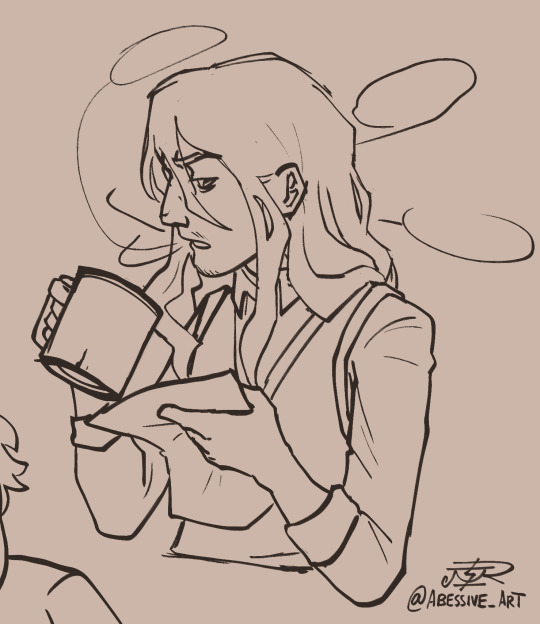
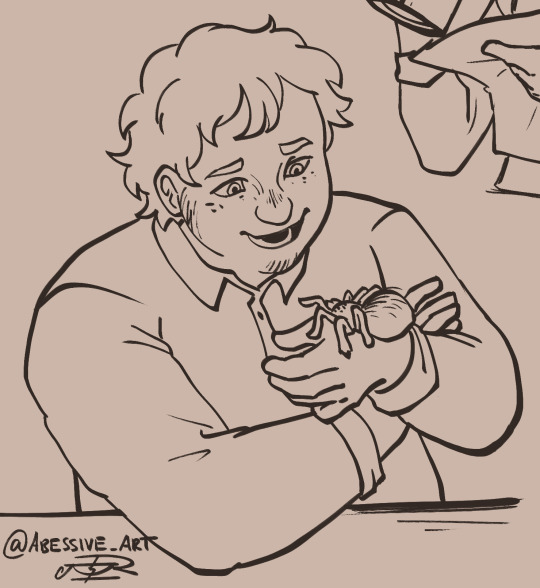
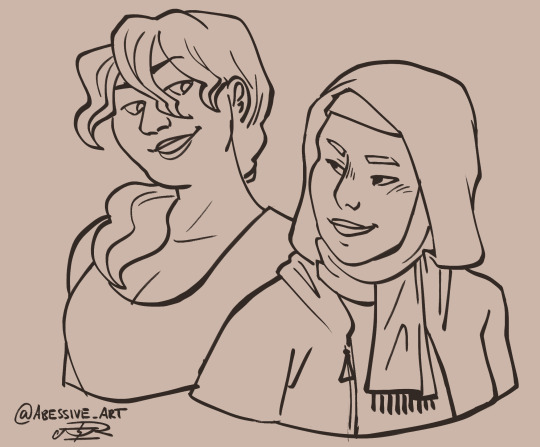
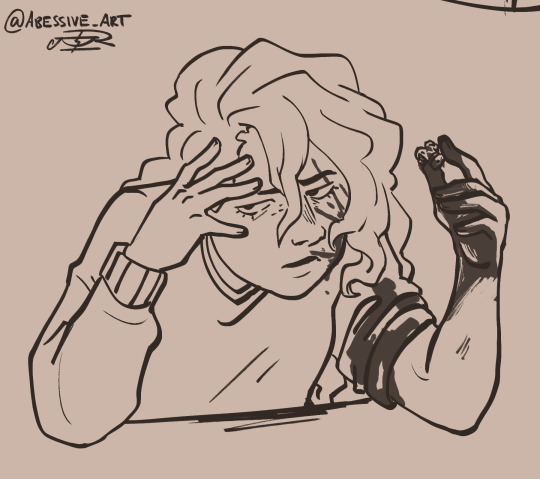
*Archives your Magnus*
#the magnus archives#tma#jonathan sims#martin blackwood#melanie king#basira hussain#daisy tonner#fanart#alice tma#tarantula#PLEASEEEEE PLease please please I love them so much this relisten is wrecking me#messing with my brain so bad i start thinking about tma and my heart n brain get scrambled#(i am very normal about media)#This podcast means sm to me :´) im so glad I came back to it <3#I have nothing new to say about the podcast i.e. literary analysis but oh man i am enjoying the hell out of it#makes me feel happy#myart
2K notes
·
View notes
Text
Something I noticed rewatching DPS that I feel like I’ve never really seen talked about before: when the Poets wake up Todd to let him know that Neil is dead, Cameron isn’t with them. He isn’t in that scene at all. Sure, maybe Charlie told him and he grieved privately in their room, but I honestly think he was an oversight and wasn’t alerted until later on.
I think this is one of the strongest explanations as to why he rats on Keating and goes so easily with authority: this is the final straw to make him feel like an outsider. As much as people like to say that Cameron is a rule follower through and through, I don’t think that’s the case. After all, he was the second person to officially join the Dead Poets Society behind Charlie.
I think Cameron has always looked for acceptance and structure, hence why he tends to be a teacher’s pet. If he can’t make friends, then he can at least find his value in being a good student. But then Neil and Keating spark something in him, a want to be accepted not for just the rules he follows but for who he is. So he hesitantly breaks the rules he found comfort in, finds community with his friends, relaxes enough to joke with them and chant and rough house.
Of course there are the small comments Charlie in particular makes to alienate him, but he’s finally doing it, he’s finally becoming a part of the friend group and valued for who he is, even if it required Charlie becoming his roommate and breaking some rules to get it.
He bristles slightly when this guy, Todd, who so clearly doesn’t want to be involved gets accepted into the group with open arms. Cameron had to fight his way in tooth and nail, provide help for homework and force jokes where he saw the others would naturally, yet here comes this silent kid who begrudges everyone yet still has the same standing as him. But he brushes it off since they’re all friends.
What serves as his breaking point is waking up the day after the play to sullen friends and tear stained faces to realize that Neil is dead, and not only that, but everyone has been told before him and have already processed it somewhat while he’s still reeling. And the worst of it all is that they even told Todd before they thought to ever wake him up, the kid who, in his eyes, had just met the guy.
Neil was arguably the Poet Cameron was closest too, and with the betrayal of his delayed announcement on behalf of the others, he trusts no one now. Not only that, but he is scorned. Why do they get a say in who gets to know first? Why does the new kid get grounds to mourn more than him?
So he turns back to the constant which has never failed him other than making him albeit a bit hollow: authority. And in his young and betrayed mind, it becomes believable that this really was all Keating’s fault, that this weird and different authority figure who made them rip up textbooks had some kind of part in disrupting the normal he had gotten used to. And this way, he really believes he’s getting justice for Neil while also saving all of the Poets from being expelled because despite the betrayal of being left behind, he still cares about them.
#I hope the Richard Cameron lovers/defenders enjoy this one#sorry idk how that one little observation evolved into all of this#it’s just such a major detail to me for explaining Cameron’s motivations yet I can’t recall anyone mentioning it#anyway enjoy this Cameron analysis sorry for rambling for so long#dead poets society#richard cameron#dps fandom#dps analysis#anderperry#dead poets fandom
194 notes
·
View notes
Text
Karma, Hearts, and Mizi's warped belief in humanity.
Hello, this is my second time making this post so please forgive me if it is not as nuanced this time around. I am mourning the fact that I accidentally deleted my first post. ANYWAY! Watching Karma, I came out of it thinking real hard about something as I started reading everyone's interpretations of what went down: you have to accept the fact that there will be multiple interpretations of everything and no one interpretation is the whole truth. That being said, below is mine on the heart scenes and how I think it all comes back to relate to Mizi.
What is the belief that humans are inherently evil or sinful creatures? In Christianity, this belief stems from the "doctrine of original sin." The belief that humans are so corrupted by sin from Adam's first sin that we have an inborn tendency to commit sin. Famous philosopher Thomas Hobbes is often quoted for this belief as well, calling humans selfish and seeking endless success in satisfying our desires. That this what we all want. So what does this have to do with Alien Stage and Karma? We know Mizi holds these beliefs. In Karma we see her say, "... humans are the root of all this pain. We're creatures who can't seem to love without exploiting."
The heart scenes prove this. The hearts represent the innocence, purity, and love that everyone holds but the blood represents the core of that love and innocence - pain, selfishness, cruelty, and evil.
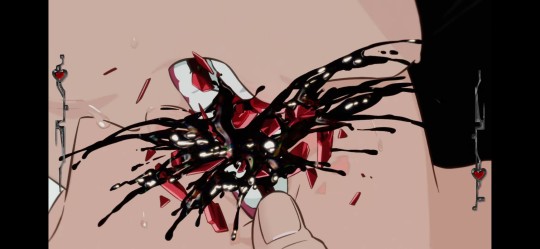
Ivan tearfully and violently forces his heart onto Till's mouth. Pushing it inside, and it shatters. The evil exploding into their mouths. Notably, Till's heart (and I did not catch this until I saw someone point it out) remains intact but hidden. It is in Ivan's collar.
Luka holds the remnants of Hyuna's and HyunWoo's hearts, evil spilled onto his hands. Notably, Luka's heart is intact but not untainted while Hyuna's is completely eviscerated - all Luka holds truly is the remaining evil.
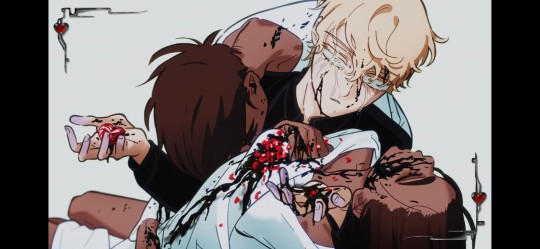
Even Mizi and Sua who hold the gentlest scene here, softly connecting two halves, are not spared. Even their love overflows with this evil.
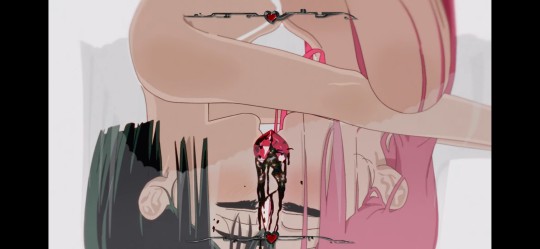
I think these scenes show what Mizi believed what everyone's love was. What she came to learn what human desire and innocence truly is. Love is exploitive, violent, and in the end no matter how gentle it is everyone suffers because they are all selfish creatures. So, of course, when she knew the rebellion was going to save humanity and give them a fighting chance to return to True Earth and live life as they should - Mizi, pushed to her mental limits, freaked out. No, she thought, the only reason we suffered is because we caused this suffering. Even if humans got to True Earth and granted freedom, we would still suffer the poison of desire and chasing pleasure - whatever that may be for a person. So, she blew up the rocket and in her eyes did the best thing for humanity: stopped them from ever having to go through what she did. Chasing freedom, love, and happiness. Mizi chased that since childhood, its all she ever knew. Of course she did, as humans we are hard wired to chase connection and love.
But my heart bleeds for Mizi because there is an unreliable narrative here and something crucial she could never understand. Her evil, everyone's "corruption," and selfish actions in Alien Stage were not an inborn evil like she believed. It was a result of their environment. It was a result of being in such unimaginable conditions, forced to survive in any way possible, and their loves being shaped by the hands of their oppressors. I think, when Mizi is faced with her choice (the rocket), she realizes this. She does not look up in satisfaction or pride over what she's done. She looks up in horror, and we see this belief start to be overruled.
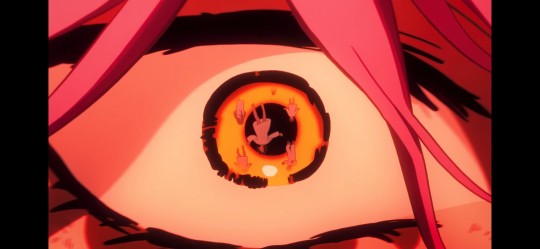
Hyuna and HyunWoo fall together, happily clinging to one another in love and happiness. All they needed was the chance to be there for each other.
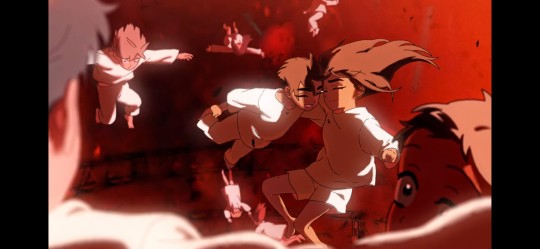
Till and Ivan fall together. Ivan looks down, tentative, and Till sees Ivan. Till reaches for Ivan first, grasps his hand, and pulls him closer to him with shining eyes and a grin. Ivan sees Till, accepts his pull, and lights up. All they needed was the time and place to see each other.

Mizi and Sua grasp each other, always seeing and loving each other. They light each other up and pull each other in, so gentle. They kiss and kiss and just love. This time, there is no suffering, no pain. Just smiles and the knowing: I love you. All they needed was each other in a place where they could simply be.
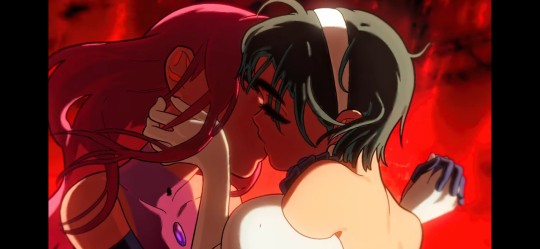
What is important in this scene is that it is their environment that is falling apart. Their environment is set ablaze and suffering. It is the oppressors that look at this in horror and scream while the humans are overcome in joy. It is the world that tries to tear into their love and call it cruelty. I genuinely believe Mizi fully understands this now, that it was not fair to pass judgement on a whole people based on the cruel circumstances they faced as victims. But she stands there knowing she can not take this back, eyes unblinking and devoid. She then clings to Till, the ghost of Sua hugging them both. I think she also represents this realization, and as she leans down, it solidifies into forgiveness. Who could truly place all blame on Mizi after all she has gone through and all the things we still do not know? She was a victim of emotion, of love being shaped by survival, and suffocating in a land humans were never supposed to be in. Everyone in the cast was.
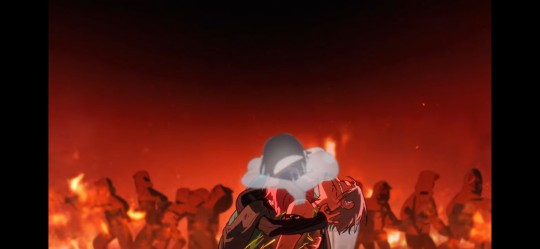
It is important to note that in all the AUs we have seen where they are free of Anakt, Alien Stage - the cast is happy. Our universe, Alien Stage, is the only one (that I have seen) where they are suffering. Where an oppressive environment drove these people into doing desperate things they never would do otherwise. It is karma. Karma is the cause and effect of someone's actions - what goes around comes around. It is not punishment or reward, it is not good nor bad, simply a result of what has happened and what will be.
In the end, Mizi atones by saving Till, humanity's last hope, and the only person in the cast who would've suffered a death not on his own terms or come as a result of karma. We see this solidified, again, by Sua when Mizi runs back into the room where we previously turned away [from looking at Sua practice her death], and hug Sua, who embraces her back.
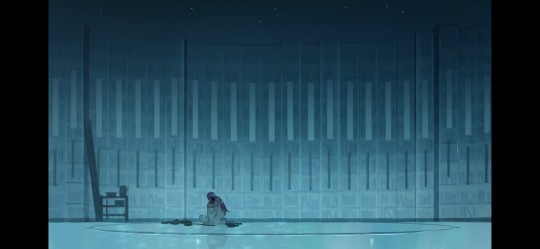
Issac at the end spells all of this out for viewers: innocence was never a luxury any of the cast could afford in this universe. That does NOT mean that they weren't innocent. They were all victims and you must see this before judging their actions, which were born out of desperation and survival. In his words, "can we really blame her for that [Mizi's desperate last act of love]?" We can hate, scream, and put these characters on trial for their sins - but we will never get a clear answer for it when their actions were never truly their own. We as a fandom must give them grace for we know not how we act when pushed to our limits. Until it is far too late.
In other timelines, given the absence of oppression, they thrive. They love with innocence. Their nature isn’t evil. Their context was. Actions devoid of innocence are violence. But when that action was full of love and the innocence of it simply torn apart by an outer force, I hesitate to call that solely violence. But they will never know that the cruelty they inflicted wasn't a result of themselves, but rather a result of the oppression around them. Unfortunately, there is no clean slate and no tidy justice here. Everyone is both a victim and vector. Everyone is breeding actions and consequences no one can fully control. That is Karma. No one is redeemed, but we can take a chance to understand them better as characters. Put these souls somewhere safe, and they'll choose love, not violence. That is the point.
May those who died rest in peace, dreaming in the next universe and Till? Go get em, kid.
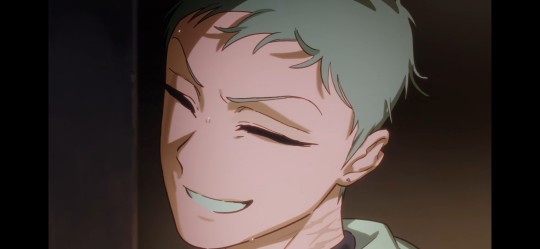
#alien stage#alnst#alnst mizi#alnst sua#alnst ivan#alnst till#mizisua#ivantill#hyuluka#alnst hyuna#alnst luka#alnst hyunwoo#alnst isaac#analysis post#alienstage#alnst karma#alnst friday#AAA i hope you guys enjoyed this post and you're free to disagree but this is my interpretation :D
223 notes
·
View notes
Text
Suddenly attacked by thoughts about how Mob's only 'dream' used to be "holding hands with Tsubomi and walking her home". I don't know how to explain this, but there's something fascinating in the fact his only plans regarding her were so... simple?
For starters, holding hands is a traditionally romantic act, and walking your partner home is quite the archetypal "good boyfriend" gesture. Mob wanted to spend time with Tsubomi, but he didn't have big ideas about proceeding with this theoretical relationship - or ideas, at all. His daydreams didn't have anything to do with either of them as individuals. Rather, it focuses them as... roles? Sort of? It calls attention to how Mob was so out of touch with his feelings he didn't know what to do about his love for Tsubomi, even though she was the driving force of his life. Being in love with an idealized version of her, he also couldn't plan much because he didn't know this girl. Oh boy this whole thing is so Mob-like in so many ways...
#you can also connect this to the fact shigeo was the one in love. he was the one who could explain it but he was severely repressed#so mob could only explain it through “tsubomi is cute” and interpret their maybe future relationship in a generic way#not taking in consideration what THEY both would enjoy as separate people#BUT I MIGHT BE ONTO NOTHING. I REALLY HAVE TO REWATCH FOR ANALYSIS REASONS BUT EXECUTIVE DYSFUNCTION IS KILLING ME#mp100#mob psycho 100#mp100 analysis#shigeo kageyama#lalá rambling...
193 notes
·
View notes
Text
My best explanation of our newest resident freak; Ramb.

Character analysis, loose ends, and questions.
I hope you like long winded “under the cut” posts about the obscure lore of irrelevant side characters.
(don't worry, I'm adhd, there's pictures and gifs.)
⠀⠀⠀⠀⠀⠀⠀⠀⠀⠀⠀⠀⠀⠀⠀⠀⠀⠀⠀
This is both an outlet for me to yell my thoughts and emotions about a fictional British power strip into the void, and an explanation on what the fuck happened to me for the people who followed me for gaster (sorry to those people, btw :’))
This will be divided into sections so that if you're specifically interested in one topic about him, then you could just skip to it! :]
⠀⠀⠀⠀⠀⠀⠀⠀⠀⠀⠀⠀⠀⠀⠀⠀⠀⠀⠀
The sections are:
First impressions; sword-route first timers VS casual players
Character analysis
The matter of ERAM.
Red flags (the red stands for “is this the secret boss?”)
Red flags 2 (the red stands for “is he okay”)
He's just a red herring, right? (well…)
What he is in this story, and will he be more? (Conclusion)
⠀⠀⠀⠀⠀⠀⠀⠀⠀⠀⠀⠀⠀⠀⠀⠀⠀⠀⠀
Let's get cracking.
⠀⠀⠀⠀⠀⠀⠀⠀⠀⠀⠀⠀⠀⠀⠀⠀⠀⠀⠀
------------------------------------------------------------------------------
First impressions; sword route first timers VS casual players.
⠀⠀⠀⠀⠀⠀⠀⠀⠀⠀⠀⠀⠀⠀⠀⠀⠀⠀⠀
This section will go over what you'd see from him on a standard run, and won't go too into analysis. It's mainly here if you aren't very familiar with his appearances in the game or need a refresher!
Feel free to skip to Character Analysis if you think this section will be redundant for you :]
⠀⠀⠀⠀⠀⠀⠀⠀⠀⠀⠀⠀⠀⠀⠀⠀⠀⠀⠀
(I really wanted to have this section be a part of the full post, but it's. Almost half of the entire thing. Also it ate up the 30 images limit.)
(So here, I posted it separately! Have a read through it if you wanna! <3)
⠀⠀⠀⠀⠀⠀⠀⠀⠀⠀⠀⠀⠀⠀⠀⠀⠀⠀⠀
----------------------------------------------------------------------------
Character analysis:
⠀⠀⠀⠀⠀⠀⠀⠀⠀⠀⠀⠀⠀⠀⠀⠀⠀⠀⠀
So… we sure do learn a lot about this random guy, huh?
⠀⠀⠀⠀⠀⠀⠀⠀⠀⠀⠀⠀⠀⠀⠀⠀⠀⠀⠀
First off, you’ve probably noticed that he’s very contradictory;
He’s caring and kind towards Kris, but he fully believes his intuition about them, and never thinks he might be wrong and should hear them out (although, with how much he’s shown to care about them, I'm sure that if Kris could and would speak out, he’ll listen to them. But they can’t, because of us)
He's extremely confident, overly self assured, to the point of getting perceived as egotistical by the other darkners, but he doesn't think of himself that highly, equating himself to his light world counterpart many times as if he isn't a person now, and being fully willing to give his life up for kris.
He’s said to be condescending to others, at least at first, but we’ve only seen kindness and care from him, probably because we’re talking to him as Kris. But his jokes and down to earth attitude seem integral to his character, and we know he didn't do anything worse than just look out for Kris.
⠀⠀⠀⠀⠀⠀⠀⠀⠀⠀⠀⠀⠀⠀⠀⠀⠀⠀⠀
These contraindications are a part of why he seems so shady to people, how can he be all these things at once? He has to be lying.
But this is just being a complicated person, like everyone else. And if you'll continue reading you’ll see that these inconsistencies actually make a lot of sense :] i’ll try my best to go through everything!
⠀⠀⠀⠀⠀⠀⠀⠀⠀⠀⠀⠀⠀⠀⠀⠀⠀⠀⠀
(this segment is a bit all over the place since it’s the first one i wrote, but there's a summary at the end :])
⠀⠀⠀⠀⠀⠀⠀⠀⠀⠀⠀⠀⠀⠀⠀⠀⠀⠀⠀
Let's start with how he confident he is about his beliefs;
⠀⠀⠀⠀⠀⠀⠀⠀⠀⠀⠀⠀⠀⠀⠀⠀⠀⠀⠀
I saw someone say that he's acting in the way a parasocial fan would, and while I get where they're coming from what with him reiterating "I know what you really want" a lot-
but it feels less like he's putting them on a pedestal and objectifying them (in fact, he's doing the complete opposite and objectifying himself) and more like he's that well meaning, distant older relative who adored you when you were younger, and hasn't yet caught up to the fact that you grew up.
A person who used to know you, who knew the child you were, and their love for you from back then still blinds them to how you've changed.
⠀⠀⠀⠀⠀⠀⠀⠀⠀⠀⠀⠀⠀⠀⠀⠀⠀⠀⠀
Mixed with his overconfidence, it makes sense that he’d believe that he knows Kris as well as they know themselves, while completely oblivious to his own blindness.
⠀⠀⠀⠀⠀⠀⠀⠀⠀⠀⠀⠀⠀⠀⠀⠀⠀⠀⠀
But how can he be so self assured but still view himself as lowly?
⠀⠀⠀⠀⠀⠀⠀⠀⠀⠀⠀⠀⠀⠀⠀⠀⠀⠀⠀
That's because we're playing as Kris! I doubt he’d talk about himself that way to anyone else.
Kris, and how they made him feel important, is the source of his confidence. He was loved and wanted by them, and so he feels like he owes them everything. Even his own life.
⠀⠀⠀⠀⠀⠀⠀⠀⠀⠀⠀⠀⠀⠀⠀⠀⠀⠀⠀
Another interpretation is that his loneliness (which we will get to) lowered his self worth outside of being Kris's toy, and he feels like that is the only thing that gives him value.
So his personality isn't completely demolished, but he doesn't really invest much time or thought into himself as a person (evidenced by how he never talked about himself to the other darkners, only about Kris.)
⠀⠀⠀⠀⠀⠀⠀⠀⠀⠀⠀⠀⠀⠀⠀⠀⠀⠀⠀
you'd think that a character with an inflated ego, like he’s said to have, would be self-absorbed and egotistical, but not him. He seems to diminish his presence when speaking with Kris, never going into detail about himself.
⠀⠀⠀⠀⠀⠀⠀⠀⠀⠀⠀⠀⠀⠀⠀⠀⠀⠀⠀
But with how off putting his behaviour is, it's really hard to believe he has our best interest at heart- he constantly remarks how he knows what kris “truly wants”, and he really wants us to play the creepy game in the console room-
⠀⠀⠀⠀⠀⠀⠀⠀⠀⠀⠀⠀⠀⠀⠀⠀⠀⠀⠀
We’ll get to the nature behind the game in a future segment (the matter of Eram), but for now let's just assume he really does want us to have fun;
His off putting behavior stems from a lack of tact. He's stuck in the memories of the Dreemurr family’s past, and he’s sure that Kris remembers him fondly. And maybe they would’ve, but I doubt they want to think about anything from their past considering… everything.
⠀⠀⠀⠀⠀⠀⠀⠀⠀⠀⠀⠀⠀⠀⠀⠀⠀⠀⠀
Speaking of their past! We weren't there! We didn't see the playing and fun they had together, most of the time when we play Deltarune we don't even think about kris- we just play the game.
To us Ramb is a stranger being overly familiar- to Ramb, he’s catching up with an old friend, and he has no idea how much they’ve changed.
⠀⠀⠀⠀⠀⠀⠀⠀⠀⠀⠀⠀⠀⠀⠀⠀⠀⠀⠀
Also, he doesn't force you to play the game! He doesn't even bring it up in the green room until after round 2, and only if you tell him you aren't having fun with Tenna. There's no pressure on you to finish all the levels if you only started one, either.
⠀⠀⠀⠀⠀⠀⠀⠀⠀⠀⠀⠀⠀⠀⠀⠀⠀⠀⠀
(telling him that you are having enough fun with Tenna)

It's on our terms, and for our fun. He keeps going with it because we keep coming back. By his own admission, his purpose is to let us (Kris) have fun.
⠀⠀⠀⠀⠀⠀⠀⠀⠀⠀⠀⠀⠀⠀⠀⠀⠀⠀⠀
Additionally, we can't ignore the silly. He's implied to be a jokester! The classics you've come to expect from these games; like sans, jevil, and even spamton, a little guy who makes funny faces and tells jokes.
⠀⠀⠀⠀⠀⠀⠀⠀⠀⠀⠀⠀⠀⠀⠀⠀⠀⠀⠀
I also want to bring up his expressions; half of his sprites have that worrying, almost troubled expression, that gives the things he says a caring and gentle feeling. It's a part of the over-familiarity. From someone you know this would be fine, but he’s this way with us from the second we meet him.
⠀⠀⠀⠀⠀⠀⠀⠀⠀⠀⠀⠀⠀⠀⠀⠀⠀⠀⠀
Now, let's bring up this bit of dialogue from before you start the second level of the mantle game:

⠀⠀⠀⠀⠀⠀⠀⠀⠀⠀⠀⠀⠀⠀⠀⠀⠀⠀⠀
The first time I read this dialogue I was stun locked for a moment. He could've just admitted to feeling lonely. He could've just outright said it, it wouldn't feel out of place in this story, Tenna admitted to it multiple times even. But Ramb didn't.
Instead, he said that if after the fountain is sealed, then if Kris felt like waking up their house again then they could. If they wanted that to happen.
Fine, weird line from him, he's got plenty.
⠀⠀⠀⠀⠀⠀⠀⠀⠀⠀⠀⠀⠀⠀⠀⠀⠀⠀⠀
"Sorry Kris. I don't know what I was saying there. Just go and enjoy the games, eh? cheers."
He felt embarrassed about admitting to feeling lonely! He always puts Kris first before anything else, and for a moment, he didn't. For a moment he mentioned that he'd like it if Kris came back after this was all over. That was weird, I'm sorry for saying that.
⠀⠀⠀⠀⠀⠀⠀⠀⠀⠀⠀⠀⠀⠀⠀⠀⠀⠀⠀
From this we can learn that he really does feel alone. His one friend will be gone soon, and that's okay, they have to leave. But it’d be nice if they came back one day. not that he’s comfortable with admitting this to us.
(This is also a hint that he knows Kris created the fountain!)
⠀⠀⠀⠀⠀⠀⠀⠀⠀⠀⠀⠀⠀⠀⠀⠀⠀⠀⠀
-------------
His similarities to Tenna :

⠀⠀⠀⠀⠀⠀⠀⠀⠀⠀⠀⠀⠀⠀⠀⠀⠀⠀⠀
Looking at the core of their characters, Ramb was written as almost another version of what Tenna is. They both care about Kris so much, they’re both lonely, ageing and growing obsolete and they know it. The differences are in how they take it.
⠀⠀⠀⠀⠀⠀⠀⠀⠀⠀⠀⠀⠀⠀⠀⠀⠀⠀⠀
Tenna is trying his best to cling to the past in fear of being thrown away, he's trying to prove to Kris that he's useful, fun, and could give them what they've been missing. This joyous nostalgic feeling they left in their childhood alongside everything that made them happy.
Throughout this entire chapter Tenna is trying to drag Kris back to that, back to him. He forces it on them when they don't comply, and fights them when they want to leave.
⠀⠀⠀⠀⠀⠀⠀⠀⠀⠀⠀⠀⠀⠀⠀⠀⠀⠀⠀
and yes a part of that is because of the knight's promise, that if he’ll do this he’ll be adored again. But to ignore the part of his motivation that's specific to Kris and the Dreemurr family as a whole would be a disservice to his character. He cares about Kris and he misses them so much, he misses what he was to them back when they needed him. He wants them to need him again.
⠀⠀⠀⠀⠀⠀⠀⠀⠀⠀⠀⠀⠀⠀⠀⠀⠀⠀⠀
Meanwhile Ramb is just as aware of his growing obsolescence as tenna is, but he seems to accept it. knowing that eventually, naturally, they’ll all be worthless.
It's a part of his role as a secret boss red herring (which I will elaborate on in its own section), a darkner who mentions their own insignificance and nihilistically accepts it naturally makes us wonder what else they're thinking about and what they know.
⠀⠀⠀⠀⠀⠀⠀⠀⠀⠀⠀⠀⠀⠀⠀⠀⠀⠀⠀
Ramb accepts his approaching end and decides to go out with a bang. He sets up another game like the ones they loved playing and gives them the option whether to actually play it or not.
Don't get me wrong, he absolutely clings to kris (or more like the memory of them as a child) just like Tenna does, but there's a difference in how they go about their emotions that sets them apart as characters, and makes it so understandable that they wouldn't be fond of each other.
⠀⠀⠀⠀⠀⠀⠀⠀⠀⠀⠀⠀⠀⠀⠀⠀⠀⠀⠀
While Tenna is stuck in the past because his self worth is dependent on it, Ramb is stuck in the past because instead of trying to make new connections in the new place he was brought to, he clung to and still clings to the first and only person who showed him love.
Ramb is completely okay with becoming obsolete, while Tenna’s life spiraled because he couldn't handle it. Tenna is desperate and controlling (fits his position as this dark world’s ruler and also his deal with the knight), while Ramb only gives you one hint to get S-rank, and only if you tell him you think Tenna's games aren't fun.
Tenna is constantly second guessing himself and worrying over doing a good job, while ramb’s excessive confidence makes him 100% sure that he knows exactly what Kris wants, and that they’ll love the games he’s offering more than Tenna’s.
⠀⠀⠀⠀⠀⠀⠀⠀⠀⠀⠀⠀⠀⠀⠀⠀⠀⠀⠀
They originate from the “same root” in a sense, but due to their different personalities, they’re complete opposites in the way they handle knowing they’re no longer as meaningful to their loved ones as they used to be.
Also, I'd feel remiss not to mention that Ramb quit his job while on a call with Tenna, then hung up on him.
⠀⠀⠀⠀⠀⠀⠀⠀⠀⠀⠀⠀⠀⠀⠀⠀⠀⠀⠀
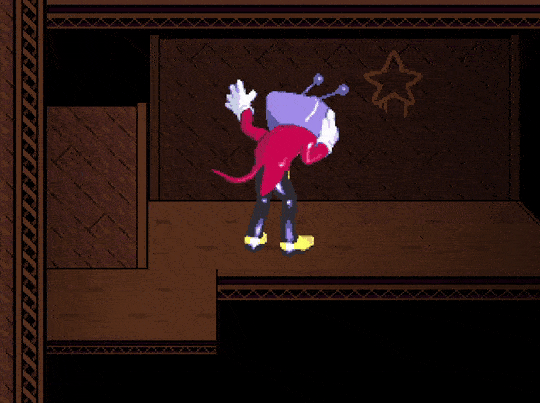
⠀⠀⠀⠀⠀⠀⠀⠀⠀⠀⠀⠀⠀⠀⠀⠀⠀⠀⠀
We don't talk about this enough me thinks. He's such a piece of shit sometimes lmfao
⠀⠀⠀⠀⠀⠀⠀⠀⠀⠀⠀⠀⠀⠀⠀⠀⠀⠀⠀
I wish we got to see Ramb interacting with other people besides Kris, I think it would tell us a lot. Because he made so much of who he is about Kris, then of course his behavior would be one way with them, and different with others. How drastically it would change would say a lot about him as a person.
We did get it with Tenna a little, but he generally doesn't like him for reasons that seem to be unrelated to kris
⠀⠀⠀⠀⠀⠀⠀⠀⠀⠀⠀⠀⠀⠀⠀⠀⠀⠀⠀
---------------
In conclusion:
To us (Kris), Ramb is a friendly, self-assured (if a little bit arrogant) guy.
He clearly cares about and loves Kris a lot, calling them luv at every opportunity and trying to better their experience in this dark world by giving them access to what he thinks is a better game than what they got.
⠀⠀⠀⠀⠀⠀⠀⠀⠀⠀⠀⠀⠀⠀⠀⠀⠀⠀⠀
The things he says to Kris and his worrying expression give him a caring and gentle air, which can have the opposite effect and come off as too forward and overstep boundaries for a lot of people.
⠀⠀⠀⠀⠀⠀⠀⠀⠀⠀⠀⠀⠀⠀⠀⠀⠀⠀⠀
He's acting overly familiar with Kris, remembering them fondly from their time together as lightner and toy, and he’s sure that Kris is on the same page as him.
And although we can't really know for sure, because Kris doesn't express their feelings or thoughts, we can assume that their bond fizzled out on Kris's end. because since the last time Ramb knew them, they’ve put everything that made them happy as a kid aside.
⠀⠀⠀⠀⠀⠀⠀⠀⠀⠀⠀⠀⠀⠀⠀⠀⠀⠀⠀
He's extremely confident, believing himself to be the one who knows Kris the best out of anyone here, and he’s sure they’ll love the original game from before Tenna messed with it a lot more than what they got in his game show.
⠀⠀⠀⠀⠀⠀⠀⠀⠀⠀⠀⠀⠀⠀⠀⠀⠀⠀⠀
Even though he’s very confident, and it's viewed as him having an ego by his peers, he's not egotistical. as his confidence stems from being loved by Kris, and believing himself to know them the best, not thinking that he’s the best, as would be assumed of a character with an “ego”.
⠀⠀⠀⠀⠀⠀⠀⠀⠀⠀⠀⠀⠀⠀⠀⠀⠀⠀⠀
Additionally, despite his obvious confidence, he seems to have relatively low-self worth outside of being Kris's toy, equating himself to his lightworld form often and never elaborating on himself as the person he is now, to us or the other darkners.
⠀⠀⠀⠀⠀⠀⠀⠀⠀⠀⠀⠀⠀⠀⠀⠀⠀⠀⠀
As time goes on we learn that he's deeply lonely, doesn’t have any friends or anyone that really likes him, and it has been that way for a while. Pretty much since he was brought to the dreemurr house.
⠀⠀⠀⠀⠀⠀⠀⠀⠀⠀⠀⠀⠀⠀⠀⠀⠀⠀⠀
Despite how lonely he is, and how much of his life revolves around Kris, he never imposes himself on them. There’s no point in the game where we have to speak with him.
⠀⠀⠀⠀⠀⠀⠀⠀⠀⠀⠀⠀⠀⠀⠀⠀⠀⠀⠀
We don't know much about his side in his relationships, but he specifically doesn't really care for his boss Tenna, and thinks he and his games are boring.
Maybe he never really wanted the job that was given to him to get rid of him, since he’s the first one to actively tell Tenna that he’s quitting. He then proceeds to hang up in his face.
⠀⠀⠀⠀⠀⠀⠀⠀⠀⠀⠀⠀⠀⠀⠀⠀⠀⠀⠀
Despite knowing that Kris is the creator of his fountain, he doesn't worship them or objectify them as a god, nor does he treat Kris the way darkners created by the knight treat the knight, their creator, with fear and admiration.
He acts more like one of your detached older family members who don't yet understand that you grew up. (His self diminishing seems to stem from low self worth and not worship.)
⠀⠀⠀⠀⠀⠀⠀⠀⠀⠀⠀⠀⠀⠀⠀⠀⠀⠀⠀
Additionally, Ramb seems to not really care about respecting authority, a trait that is rare for darkners.
like how he treats Kris like family and not authority, And how he gives us access to the original game against Tenna’s wishes. Although it's important to mention that he thinks of himself as lesser than Kris.
⠀⠀⠀⠀⠀⠀⠀⠀⠀⠀⠀⠀⠀⠀⠀⠀⠀⠀⠀
He's fully willing to sacrifice himself for us, to give himself up completely, if there is a chance that his efforts will work and Kris will have fun.
----------------------------------------------------------------------------
⠀⠀⠀⠀⠀⠀⠀⠀⠀⠀⠀⠀⠀⠀⠀⠀⠀⠀⠀
The matter of ERAM.
And why they're not actually the same person (hear me out it makes ramb a better character.)
⠀⠀⠀⠀⠀⠀⠀⠀⠀⠀⠀⠀⠀⠀⠀⠀⠀⠀⠀
I get why people are fond of it. Ramb being the person behind eram would be awesome and a cool twist for his character and add to his significance in the story.
And by all means! Go for it! It makes for an awesome visual and cool art!!
⠀⠀⠀⠀⠀⠀⠀⠀⠀⠀⠀⠀⠀⠀⠀⠀⠀⠀⠀
But hear me out… when it comes to the intent of the story… narratively, it doesn't make any sense.
Sometimes kindness and seemingly well meaning actions in this game really are just that.
⠀⠀⠀⠀⠀⠀⠀⠀⠀⠀⠀⠀⠀⠀⠀⠀⠀⠀⠀
--------------
Now before we begin, let's establish some things;
First of all; without anyone asking him to, Ramb has sacrificed a lot for Kris.
He gave up the opportunity to make any connections in the new place he was brought to, by always commenting on others and their work. This made him alienated from anyone he could've been friends with, because he staked everything he is and could’ve had on his purpose to his lightner.
In the path where you don't humor him, you end up learning how lonely he truly was, how no one could stand him, and how much his caring for and loving you alienated him, to the point of complete social isolation. To the point where he felt like he didn't belong where he was, and was already turning to stone on the inside a long time ago.
⠀⠀⠀⠀⠀⠀⠀⠀⠀⠀⠀⠀⠀⠀⠀⠀⠀⠀⠀
His ostracization was mostly his doing, and it is rooted in caring.
(If there was any other reason that Ramb was outcasted, then the pippins who clearly disliked him wouldn't protect his image and would tell us.)
⠀⠀⠀⠀⠀⠀⠀⠀⠀⠀⠀⠀⠀⠀⠀⠀⠀⠀⠀
----------
And secondly; The mantle game changes with the insertion of the oddcontroller.
When you first turn on the console, the title screen comes up just like it does at the beginning of “The legend of Tenna”, Tenna’s version of the game. But no controller is connected and the console turns off. Leaving the room, we find the oddcontroller on the ground, it is said to have pink and yellow buttons.
When the oddcontroller is connected to the console, The game immediately glitches out and shows our soul, us, inside 8bit kris. That never happens in any other variation of the game.
⠀⠀⠀⠀⠀⠀⠀⠀⠀⠀⠀⠀⠀⠀⠀⠀⠀⠀⠀
Everytime you play the game again, the title screen comes up like normal. Kris then connects the oddcontroller, the game glitches out, and shows us the soul. It seems that the thing causing the difference is the act of connecting the controller.
⠀⠀⠀⠀⠀⠀⠀⠀⠀⠀⠀⠀⠀⠀⠀⠀⠀⠀⠀
------------------
Here are the main reasons i've seen for why people think Eram is Ramb:
Ramb is very off putting
They have similar names
Ramb really wants us to play his game, and it turns out to be a horrifying experience for kris
⠀⠀⠀⠀⠀⠀⠀⠀⠀⠀⠀⠀⠀⠀⠀⠀⠀⠀⠀
Let's tackle em’!
⠀⠀⠀⠀⠀⠀⠀⠀⠀⠀⠀⠀⠀⠀⠀⠀⠀⠀⠀
Ramb is very off putting.
That's by design! He’s supposed to evoke that feeling you get from distant family relatives who remember you from when you were younger, but you have no memory of them.
⠀⠀⠀⠀⠀⠀⠀⠀⠀⠀⠀⠀⠀⠀⠀⠀⠀⠀⠀
Kris has been through a lot, we still don't know the exact events, but trauma is obvious and prevalent in their character. They've since put a lot of their joy aside. Their room is empty, they don't watch tv or play games anymore, they don't visit noelle, even just to play her piano, preferring the one in the hospital.
And Ramb is an old toy of Kris', from when they were a child. It wouldn't be unlikely that the last time they played with him was before they put their joys aside.
⠀⠀⠀⠀⠀⠀⠀⠀⠀⠀⠀⠀⠀⠀⠀⠀⠀⠀⠀
Ramb would have no way of knowing everything that's gone on with Kris since they last saw each other, and he’d assume that their life’s just naturally continued without him, but remain sure that they still remember him fondly.
He views himself as your old friend, because that's what Kris and him were before, he doesn't know who Kris is anymore, and he has no idea.
⠀⠀⠀⠀⠀⠀⠀⠀⠀⠀⠀⠀⠀⠀⠀⠀⠀⠀⠀
And on top of that, YOU as the player weren't there for it all- you didn't see Kris playing with Ramb, and you didn't see Ramb being happy to assist Kris in having fun. To you, Ramb is a stranger, and him acting overly familiar with you causes discomfort and unease.
And Ramb is only speaking with Kris, because he has no idea you're there controlling them.
⠀⠀⠀⠀⠀⠀⠀⠀⠀⠀⠀⠀⠀⠀⠀⠀⠀⠀⠀
They have similar names
That they do, Eram and Ramb are only one letter apart. But does Ralsei having a name that's a 1 to 1 of Asriels, and even seemingly having similar personalities make them the same person? No, and I hope to god you don't still believe that. Please believe me when i say that Toby wouldn't put incest in his game.
Eram and Ramb are opposites. Ramb only wants Kris to have fun, while Eram is obsessed with making Kris suffer. Ramb wants us to play a game where we get to make choices, and Eram forces us to play the one route the oddcontroller allows for.

⠀⠀⠀⠀⠀⠀⠀⠀⠀⠀⠀⠀⠀⠀⠀⠀⠀⠀⠀

⠀⠀⠀⠀⠀⠀⠀⠀⠀⠀⠀⠀⠀⠀⠀⠀⠀⠀⠀
(Also, stupidly, Eram isn't british)
⠀⠀⠀⠀⠀⠀⠀⠀⠀⠀⠀⠀⠀⠀⠀⠀⠀⠀⠀
3. Ramb really wants us to play his game, and it turns out to be a horrifying experience for kris
⠀⠀⠀⠀⠀⠀⠀⠀⠀⠀⠀⠀⠀⠀⠀⠀⠀⠀⠀
It's a little weird that Ramb tells us that this is a game where we decide what to do, but the only way to progress is through killing. Which is part of why people think he’s very sketchy and a liar.
But what if the original game, before the insertion of the oddcontroller, was exactly that? A game similar to undertale, where there are different paths you can take, where your choices determine the kind of game you play? A game where you CAN make choices?
⠀⠀⠀⠀⠀⠀⠀⠀⠀⠀⠀⠀⠀⠀⠀⠀⠀⠀⠀
But with the oddcontroller, there’s only one path. only one option, a glitchy, game breaking option, the weird route.
I'd also like to bring up the name “odd controller”, in relation to what we do in the game and what that stands for- Odd is another word for weird.
⠀⠀⠀⠀⠀⠀⠀⠀⠀⠀⠀⠀⠀⠀⠀⠀⠀⠀⠀
But sure, maybe Ramb was the one who put the odd controller in the hallway outside the console room, he is standing right outside the door after all. But if it's true that Ramb’s intention was for us to play the game with this controller, why not give it to us when we enter the room? We have to speak with him to enter anyway.
And why say that he “set up the game for us” if there's no controller connected? Just to wait a few seconds to leave it in the hallway?
⠀⠀⠀⠀⠀⠀⠀⠀⠀⠀⠀⠀⠀⠀⠀⠀⠀⠀⠀
This is a story, fully written in advance. If the intention was for us to suspect or think this corrupt version of the game is what Ramb intended for us to play, why not have the oddcontroller already connected to the console? Then we as players would have no doubt that this experience was this character’s full intention.
That part, where you have to leave the room to find a controller that is different from the ones you're used to, seems to be there to separate Ramb from whoever wants us to play the mantle game’s version of the weird route.
⠀⠀⠀⠀⠀⠀⠀⠀⠀⠀⠀⠀⠀⠀⠀⠀⠀⠀⠀
------------------
But hold on, what if Ramb is intentionally putting on a front, acting and lying to make us believe his two personas?
⠀⠀⠀⠀⠀⠀⠀⠀⠀⠀⠀⠀⠀⠀⠀⠀⠀⠀⠀
…why? What would he gain from that? He already gets us curious enough to play the game as Ramb, why continue to put up a front even when he and Kris are completely alone, even at the very last moments of his life?
Speaking of which, how is he able to battle Kris as Eram when he’s shown to be almost fully stone, and unable to move himself enough to unblock the entry? To turn and look at us? How would he use a controller?
If he’s faking being stone too, then how? And what’s the reason? What does he gain?
⠀⠀⠀⠀⠀⠀⠀⠀⠀⠀⠀⠀⠀⠀⠀⠀⠀⠀⠀
Also, if we are assuming he’s lying; then everything, his feelings, his character and his emotional issues, None of it was real. All that nuance, depth, character, It was all fake, a lie. For the plot twist that in fact he actually… thinks we're weird for enjoying the game?
⠀⠀⠀⠀⠀⠀⠀⠀⠀⠀⠀⠀⠀⠀⠀⠀⠀⠀⠀
Narratively, it doesn't make sense. If he’s lying, why not reveal it? In his last moments with us, as Eram or Ramb, why not reveal that this entire time he just wanted us to suffer?
If he’s lying, then why are we repeatedly told, so many times, how lonely he was? How much he cared about Kris? Why is it said to us after he’s already gone, on the path where you don't even play his game, when the lie wouldn't matter?
The story doesn't benefit from the unclarity that this brings once Ramb and Eram are both already gone.
⠀⠀⠀⠀⠀⠀⠀⠀⠀⠀⠀⠀⠀⠀⠀⠀⠀⠀⠀
I know that the main reason behind this theory is Ramb’s off-putting over familiarity, combined with the horrors the game harbours and how happy he is to show it to us.
But if you take his word that he really didn't see anyone come in (maybe whoever is behind Eram doesn't need to use the door), and look at the context of his life as this lonely guy suddenly seeing the god who gave him purpose as their toy, and brought him to life with the fountain, and understand that yeah, he’d be ecstatic.
Then him honestly looking out for Kris at every opportunity, even before he saw them again, makes a lot more sense than an unprovoked backstab.
⠀⠀⠀⠀⠀⠀⠀⠀⠀⠀⠀⠀⠀⠀⠀⠀⠀⠀⠀
Eram has no issue with harming the real kris, both physically and emotionally. Before the fight begins, Eram taunts Kris, goes along with the game that's slowly changing from a standard rpg to a horror show about Kris's life and struggles.
If the player is on the weird route, they even accuse Kris of being a hypocrite, saying they’re blaming the soul for all the harm they caused, trying to feel better about themselves. And in the fight against them Kris takes real damage and can die.
⠀⠀⠀⠀⠀⠀⠀⠀⠀⠀⠀⠀⠀⠀⠀⠀⠀⠀⠀
If Ramb were actually the one behind eram, then he was lying when he was looking out for what's best for Kris even when they weren't there… because? He alienated himself by constantly lying about caring for Kris… because??... and him letting himself die for us to continue having the fun he’s sure we're having… just to make fun of us- why??
⠀⠀⠀⠀⠀⠀⠀⠀⠀⠀⠀⠀⠀⠀⠀⠀⠀⠀⠀
Remember that pippins who tells us all about how much ramb sucked and everyone hated him- If there was malice in Ramb’s intentions or behind his actions before we entered the dark world, that pippins would be the last person to hide it from us! Y’know, cus they hate him!!
⠀⠀⠀⠀⠀⠀⠀⠀⠀⠀⠀⠀⠀⠀⠀⠀⠀⠀⠀
Ramb’s story is empty on purpose, it's supposed to be like this. It's supposed to give you the feeling of “this isn't all he is, right?” It's abnormally sad and I wish I could say that this is just me going overboard with my analysis of him, but this is literally just his actions and what we were told about him.
Ramb was written as the red herring for this chapter's secret boss, to me the twist about him was that after all of that he ended up to not be important, that after all of the hints and the winks, it turns out he doesn't know shit.
⠀⠀⠀⠀⠀⠀⠀⠀⠀⠀⠀⠀⠀⠀⠀⠀⠀⠀⠀
Making him the person behind a character that clearly knows a lot and doesn't much care for Kris's well-being, erasing and warping the sincerity of everything he did, would take away from the gut punch that his last conversation with Kris or the explanation from that Pippins is trying to give us.
It would make for a hell of a twist, but is it worth it narratively? Does it make sense? Like no not at all. We're learning about this sad older guy trying to make the one person he’s sure still likes him happy no matter the cost, even if it costs him his life.
Just for a twist that he thinks they're weird for enjoying the games that he wanted them to play??
-------
⠀⠀⠀⠀⠀⠀⠀⠀⠀⠀⠀⠀⠀⠀⠀⠀⠀⠀⠀
So if Ramb isn't eram, who is?
I don't know, this post is about Ramb!!
⠀⠀⠀⠀⠀⠀⠀⠀⠀⠀⠀⠀⠀⠀⠀⠀⠀⠀⠀
But I do have a guess that I'm rather confident about. I won't go into detail about it here cus i already derail this post at every opportunity, and also I want to write another dissertation of the mantle games specifically, separate from Ramb, so I'll save this for another time.
But in short, it’s Friend. And this was our first real look at them as a character and their role and purpose in this story.
---------------------------------------------------------------------------
⠀⠀⠀⠀⠀⠀⠀⠀⠀⠀⠀⠀⠀⠀⠀⠀⠀⠀⠀
Red flags (the red stands for “is this the secret boss?”)
⠀⠀⠀⠀⠀⠀⠀⠀⠀⠀⠀⠀⠀⠀⠀⠀⠀⠀⠀
I'm sure that a large majority of first time players looked at this manlet going on and on about “freedom”, and immediately thought that he’ll be the secret boss. Since, y’know, that was by design!
⠀⠀⠀⠀⠀⠀⠀⠀⠀⠀⠀⠀⠀⠀⠀⠀⠀⠀⠀
Ramb was written to tick all the boxes of a secret boss. he’s short, hinted at being knowledgeable about things he shouldn't be, “freedom”, constantly referring to kris by name, quoting both Jevil and Spamton, playing a role only outside the main story, hell even the fact that he speaks differently than the rest of the darkners-
We're meant to look at him and immediately assume that at some point we’ll fight him and get the shadow crystal. Just like we assumed we’ll seal the fountain at the end of the chapter, and get a light world segment before going back home, watch Kris rip out their soul, and roll credits.
⠀⠀⠀⠀⠀⠀⠀⠀⠀⠀⠀⠀⠀⠀⠀⠀⠀⠀⠀
Chapter 3 throws all of that out the window! And Ramb is a part of it. We assumed we know the way secret bosses work and will play out for the rest of the game, a part of the “Deltarune formula” that we were so convinced of. But we were wrong!
The way chapter 3 flirts with it and then completely shatters it and our expectations of what will be is a part of why i love these games so much.
⠀⠀⠀⠀⠀⠀⠀⠀⠀⠀⠀⠀⠀⠀⠀⠀⠀⠀⠀
When a player stumbles upon a petrified Ramb, the thought that they messed up the sequence that leads up to the secret boss might cross their mind. While a player who got to the end of the sword game and watched as Ramb disappeared after the shadow mantle was acquired might feel confused;
yeah i just finished a cool mini boss, but that's hardly a secret boss, and i didn't even get a shadow crystal. wasn't that the lead up to something with the little guy?
⠀⠀⠀⠀⠀⠀⠀⠀⠀⠀⠀⠀⠀⠀⠀⠀⠀⠀⠀
And when the lord of screens is cleaved red by blade is when it all shatters- we’d assume that after the fight with Tenna, Ralsei and Susie will talk to him, he’ll want to come to our castle town, we seal the fountain, ect ect. But instead, he falls to the ground, unconscious, and we are faced with the knight.
⠀⠀⠀⠀⠀⠀⠀⠀⠀⠀⠀⠀⠀⠀⠀⠀⠀⠀⠀
We don't get to seal the fountain, we don't get a light world segment, and we don't get to see Kris rip us out. We don't get a secret boss. Deltarune was never meant to be predicted!
⠀⠀⠀⠀⠀⠀⠀⠀⠀⠀⠀⠀⠀⠀⠀⠀⠀⠀⠀
Ramb, as the character that he is, is a part of the aforementioned flirting with the concept of a formula. Cus we do get a weird little guy who's spouting nonsense and acting odd- but he's not the secret boss, because we don't get one this chapter.
⠀⠀⠀⠀⠀⠀⠀⠀⠀⠀⠀⠀⠀⠀⠀⠀⠀⠀⠀
(you might say that the knight is the secret boss… but aren't those supposed to be like… secret? The battle with the knight is unavoidable, and CAN be beaten without the shadow mantle if you just don't get hit- so… it's just a regular battle like Tenna or Queen. Just an extremely tough one that you're meant to die to at the end.
If you survive for long enough you get a weapon and a crystal, but guys-
The fight isn’t hidden. It's unavoidable. It can be beaten even without the shadow mantle. The flavor text “The air crackles with freedom” doesn’t show up in the fight. The knight doesn't have the freedom leitmotif in its theme.
⠀⠀⠀⠀⠀⠀⠀⠀⠀⠀⠀⠀⠀⠀⠀⠀⠀⠀⠀
Before the chapter came out I was lamenting on what “no mantle, no crystal.” means. I thought that we’d acquire the shadow mantle somehow and only then will the battle be able to trigger, like without it there wouldn't even be a fight! (Like how you can’t climb without the gear that jackenstein gives you.)
⠀⠀⠀⠀⠀⠀⠀⠀⠀⠀⠀⠀⠀⠀⠀⠀⠀⠀⠀
I'm of the opinion that we shouldn't expect all the chapters to play out exactly the way we thought, not having a standard secret boss encounter this chapter was intentional, and there's no real reason to try and fit the knight or Eram into boxes they don't fit-
-------------------
⠀⠀⠀⠀⠀⠀⠀⠀⠀⠀⠀⠀⠀⠀⠀⠀⠀⠀⠀
So… what all this talk about Ramb as if he actually was the secret boss? If he truly is just a red herring gotcha moment side character npc, why the 16K words essay?
⠀⠀⠀⠀⠀⠀⠀⠀⠀⠀⠀⠀⠀⠀⠀⠀⠀⠀⠀
As much as I want to keep my expectations grounded, there are certain things that don't fit the description of just “red herring”. I truly wish he was just that, and could be spared from the horrors of being a shadow crystal bearer, or being a significant character in this story (that never seems to be easy), and I could be spared from writing the rest of this.
But there are just too many loose ends, questions, information we were given for seemingly no reason- that make me wonder what Toby has in mind.
------------------------------------------------------------------------------
⠀⠀⠀⠀⠀⠀⠀⠀⠀⠀⠀⠀⠀⠀⠀⠀⠀⠀⠀
Red flags 2 (the red stands for “is he okay”)
⠀⠀⠀⠀⠀⠀⠀⠀⠀⠀⠀⠀⠀⠀⠀⠀⠀⠀⠀
This section will go through and analyse the more emotional aspects of his character and what he is in this story. Less “why was he put here” and more “how does he feel about being put here”. The feels, if you will.
⠀⠀⠀⠀⠀⠀⠀⠀⠀⠀⠀⠀⠀⠀⠀⠀⠀⠀⠀
Let’s start by bringing up the infamous roast session;
While we do learn a lot about Ramb when talking directly to him, we learn a whole lot more after he’s gone, from the random pippins that seems to stand in for the rest of the darkners that knew him.
⠀⠀⠀⠀⠀⠀⠀⠀⠀⠀⠀⠀⠀⠀⠀⠀⠀⠀⠀
First of all, just the fact that we learn more about ramb from someone else rather than himself says a lot. I already mentioned it in the character analysis part, but he seems to never really focus on himself during our conversations with him, and would much rather talk about Kris and what they want and how they feel, in a way that is reminiscent of ralsei.
⠀⠀⠀⠀⠀⠀⠀⠀⠀⠀⠀⠀⠀⠀⠀⠀⠀⠀⠀
One of the differences between them being that while ralsei is truly trying his best to look for kris through our inputs on their behavior, building them up and cheering us both on,
ramb, thanks to how confident he is, thinks he knows exactly what kris wants without second guessing himself for a second (until the very end)
⠀⠀⠀⠀⠀⠀⠀⠀⠀⠀⠀⠀⠀⠀⠀⠀⠀⠀⠀
(he was somehow right? Which adds to how he was made to make people think he’ll be the secret boss because he knew Kris wanted “freedom”. but this is just his lucky assumption, and has to do with what games Tenna is allowing Kris to play, not how Kris wants to be free from our control. Ramb had no idea.)
⠀⠀⠀⠀⠀⠀⠀⠀⠀⠀⠀⠀⠀⠀⠀⠀⠀⠀⠀
(not to even get into how the mantle games vs Tenna’s version of them are a meta commentary on Deltarune’s linear story and how breaking out of if and achieving “freedom” comes at a great cost for the characters, that is a WHOLE other conversation and we’re talking about power strip mental health right now not this-)
⠀⠀⠀⠀⠀⠀⠀⠀⠀⠀⠀⠀⠀⠀⠀⠀⠀⠀⠀
Just for a second, I wanna bring up the fact that he's a plugboy. While yes the plugboys from chapter 2 do differ from each other visually, they’re all clearly the same darkner species, and they all resemble plug types that would be of the same, mostly american socket type.

⠀⠀⠀⠀⠀⠀⠀⠀⠀⠀⠀⠀⠀⠀⠀⠀⠀⠀⠀
While Ramb is a European plug type. He’s fundamentally different. (Note how different Ramb looks to the other plugboys, and his smiling expression vs the original plugboys naturally ‘surprised’ look)
It's impossible to connect an American plug to this type of socket. What I'm trying to say is; he couldn’t connect with anyone.
⠀⠀⠀⠀⠀⠀⠀⠀⠀⠀⠀⠀⠀⠀⠀⠀⠀⠀⠀
Back when I played chapter 3 for the first time and learned Ramb was from the library, I thought it was really weird. What, he was essentially kidnapped and no one in chapter 2 said anything?
No one mentioned a plug named “ramb”, not even talked about a purple plugboy who used to live here. Not even “a plugboy” who’s now gone. I shrugged it off as extremely light retconning, maybe he was written after chapter 2 was completed.
⠀⠀⠀⠀⠀⠀⠀⠀⠀⠀⠀⠀⠀⠀⠀⠀⠀⠀⠀
But when I think about it now, it makes total sense. The reason he didn't seem to mind being taken from his original dark world, his home, the reason he adores Kris so much, and why no one in cyber world mentioned him or said anything about him being gone;
⠀⠀⠀⠀⠀⠀⠀⠀⠀⠀⠀⠀⠀⠀⠀⠀⠀⠀⠀
it's because he didn't matter to anyone back there either. The first time he felt loved and wanted was as Kris's toy.
⠀⠀⠀⠀⠀⠀⠀⠀⠀⠀⠀⠀⠀⠀⠀⠀⠀⠀⠀
Of course he'd get attached to them, I'm honestly surprised he isn't constantly imposing himself on us- there isn't a single point in the game where you have to talk to him, if you never choose to do that, you don't even learn his name.
⠀⠀⠀⠀⠀⠀⠀⠀⠀⠀⠀⠀⠀⠀⠀⠀⠀⠀⠀
Similarly to Tenna, Ramb clung to the past, to that time in his life he felt happy and loved. He couldn't (or wouldn't) move on.
No one in Cyber world liked him, no one in the dreemurr house liked him, so he gave up. He no longer tried to make connections with new people. Instead of retaining who he is and living for himself, even if no one likes it, he let himself get stuck in the memories of being loved, once, a long time ago.
—----
⠀⠀⠀⠀⠀⠀⠀⠀⠀⠀⠀⠀⠀⠀⠀⠀⠀⠀⠀
Inside, he was probably stone already.
Back to the infamous roast session, specifically to the last thing that was said about him there;

⠀⠀⠀⠀⠀⠀⠀⠀⠀⠀⠀⠀⠀⠀⠀⠀⠀⠀⠀
“Inside, he was probably stone already.”
⠀⠀⠀⠀⠀⠀⠀⠀⠀⠀⠀⠀⠀⠀⠀⠀⠀⠀⠀
Have you ever seen a more obvious depression metaphor?
⠀⠀⠀⠀⠀⠀⠀⠀⠀⠀⠀⠀⠀⠀⠀⠀⠀⠀⠀
In chapter 3, a darkner turning to stone was revealed to be connected to a mental and emotional state, and not just where the object is originally from, which to be honest, in retrospect makes a lot more sense.
(What if an object was somewhere it didn't belong when a fountain was created, then brought back to the place they belong, would they turn to stone just because they happen to be somewhere else first? Also turning to stone being more about feelings just fits these games doesn't it. anyway)
⠀⠀⠀⠀⠀⠀⠀⠀⠀⠀⠀⠀⠀⠀⠀⠀⠀⠀⠀
One of the very first things that we learn about Ramb, straight from him, is how Kris and Asriel brought him to their house from the library, maybe around the time Noelle and Kris played make believe with other objects from there and the unused classroom.
But that's all we learn from him about why he's here and how he feels about it. Which is to say we learn nothing because he never elaborates about himself-
⠀⠀⠀⠀⠀⠀⠀⠀⠀⠀⠀⠀⠀⠀⠀⠀⠀⠀⠀
Then, after he’s turned to stone, we learn from the pippins that after Ramb was brought here by kris, he cared about them so much that he made sure the others are thinking about them and what's best for them too, because to him their plans weren’t good enough for kris. He wanted the very best for them.
His fixation on Kris and his condescending attitude that was perceived as ego isolated him as he turned insufferable in their eyes.
⠀⠀⠀⠀⠀⠀⠀⠀⠀⠀⠀⠀⠀⠀⠀⠀⠀⠀⠀
Tenna wanted to get rid of him, no one liked his humor, he rarely got any customers, and no one will even care that he’s gone. Other newcomers in the house fit in fine, while he never truly belonged. The pippins is relieved if you tell them that you don't wanna hear more about him.
⠀⠀⠀⠀⠀⠀⠀⠀⠀⠀⠀⠀⠀⠀⠀⠀⠀⠀⠀
Turning to stone on the inside. Being stone as you still continue to live. A darkner turns to stone when they feel like they don't belong, when even if they try their hardest to fit in, they don't have a place that’s for them where they are. When their connections can't save them and they want to be somewhere else, someone else.
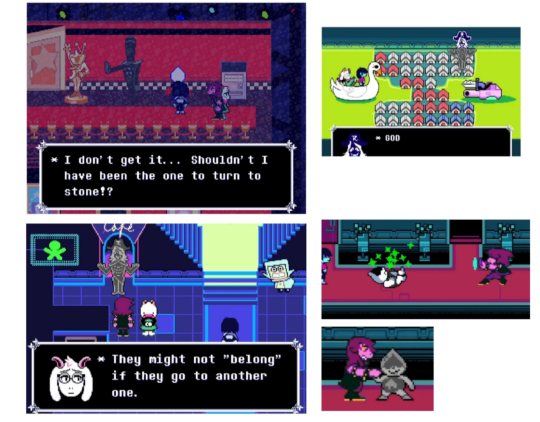
⠀⠀⠀⠀⠀⠀⠀⠀⠀⠀⠀⠀⠀⠀⠀⠀⠀⠀⠀
Ramb felt like he didn't belong here so badly that the feeling manifested, turning him to stone from the moment the fountain opened, maybe even before.
It's depression. Moreover, it's like smiling depression- he never lets us see any of it, he smiles and is friendly with us, there's no reason to think anything is wrong until you learn more about his situation.
⠀⠀⠀⠀⠀⠀⠀⠀⠀⠀⠀⠀⠀⠀⠀⠀⠀⠀⠀
Kinda reminds you of someone, right?
⠀⠀⠀⠀⠀⠀⠀⠀⠀⠀⠀⠀⠀⠀⠀⠀⠀⠀⠀

⠀⠀⠀⠀⠀⠀⠀⠀⠀⠀⠀⠀⠀⠀⠀⠀⠀⠀⠀
“How about the usual?”
That joke should be familiar to true truck freaks;
⠀⠀⠀⠀⠀⠀⠀⠀⠀⠀⠀⠀⠀⠀⠀⠀⠀⠀⠀
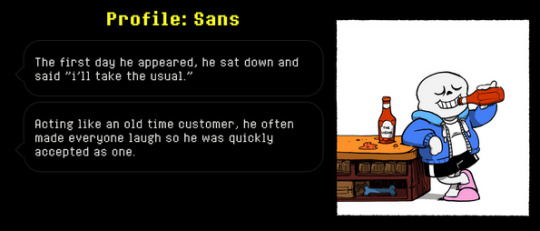
⠀⠀⠀⠀⠀⠀⠀⠀⠀⠀⠀⠀⠀⠀⠀⠀⠀⠀⠀
“i’ll take the usual.”
⠀⠀⠀⠀⠀⠀⠀⠀⠀⠀⠀⠀⠀⠀⠀⠀⠀⠀⠀
It's the same joke Sans made when he first came to Grillby’s. The differences being that while sans told it as a first time customer, Ramb told it as a first time bartender. And of course, people laughed at Sans's joke, and immediately accepted him as the old timer he joked about being, while no one laughed with Ramb.
⠀⠀⠀⠀⠀⠀⠀⠀⠀⠀⠀⠀⠀⠀⠀⠀⠀⠀⠀
The similarities between sans and Ramb are kinda like when you learn a new word and start seeing it everywhere;
⠀⠀⠀⠀⠀⠀⠀⠀⠀⠀⠀⠀⠀⠀⠀⠀⠀⠀⠀
They're both shorties
They both mask their depression with humor and an unassuming, modest attitude
They both constantly smile
They both wink a lot
Both are in worlds they don't belong in
Both never go into detail about themselves
Both refer to the player character as a friend immediately
Both seem to build up all they are around someone else (Sans with Papyrus and Ramb with Kris)
⠀⠀⠀⠀⠀⠀⠀⠀⠀⠀⠀⠀⠀⠀⠀⠀⠀⠀⠀
It's not that this implies they know each other or anything- the only thing these similarities tell me is that we’re given more about Ramb's personality and ‘vibe’ through a character he’s similar to and we're already familiar with.
⠀⠀⠀⠀⠀⠀⠀⠀⠀⠀⠀⠀⠀⠀⠀⠀⠀⠀⠀
Like, what if sans didn't have papyrus constantly at his side? What if no one liked his jokes? What if he couldn't make friends? What if he didn't have the ability to control where he went? What if he felt truly, deeply, alone?
While their personalities and circumstances are obviously not identical, I think these similarities are very interesting.
⠀⠀⠀⠀⠀⠀⠀⠀⠀⠀⠀⠀⠀⠀⠀⠀⠀⠀⠀
(Just for the sake of not mischaracterizing sans, we're in 2025 not 2016, I wanna clarify that I'm aware a big part of sans' pain stems from his inability to go anywhere outside Undertale as a universe (wherever or whatever “going back” means), but I was thinking more like. What if he was just stuck inside MTT resort, y’know?)
—-
⠀⠀⠀⠀⠀⠀⠀⠀⠀⠀⠀⠀⠀⠀⠀⠀⠀⠀⠀
Implications that he doesn’t value himself as a person
⠀⠀⠀⠀⠀⠀⠀⠀⠀⠀⠀⠀⠀⠀⠀⠀⠀⠀⠀
If you were suddenly face to face with the one person who ever liked you, after years of being apart, if under their gaze, you felt more appreciated as a person than you have in all the years since you've last seen them, what would you do?
⠀⠀⠀⠀⠀⠀⠀⠀⠀⠀⠀⠀⠀⠀⠀⠀⠀⠀⠀
I'd hope to god your answer isn't anything close to what Ramb did.
Because this guy gave up on so much of his life for Kris, even before he saw them again, until he gave up his life for them completely.
⠀⠀⠀⠀⠀⠀⠀⠀⠀⠀⠀⠀⠀⠀⠀⠀⠀⠀⠀
In his last moments with us, he continues to try and make sure Kris has fun.
Knowing he will soon turn to stone, as far he knows, forever, He still continues to try and please Kris.
⠀⠀⠀⠀⠀⠀⠀⠀⠀⠀⠀⠀⠀⠀⠀⠀⠀⠀⠀


He’ll watch out for Kris for as long as he's conscious enough to see and speak.
⠀⠀⠀⠀⠀⠀⠀⠀⠀⠀⠀⠀⠀⠀⠀⠀⠀⠀⠀



He sees his own uncooperative body not as a detriment to himself, but a bother for Kris, who now has to shove him out of the way, because he started to die before he could unblock the entry to the room.
⠀⠀⠀⠀⠀⠀⠀⠀⠀⠀⠀⠀⠀⠀⠀⠀⠀⠀⠀
Instead of doing anything for himself before he fully turns to stone, he chooses to set up one last game for us. His smile never falters and he wishes us a fun time.
⠀⠀⠀⠀⠀⠀⠀⠀⠀⠀⠀⠀⠀⠀⠀⠀⠀⠀⠀
I mentioned this before, but this part of his behavior is very reminiscent of Ralsei.
⠀⠀⠀⠀⠀⠀⠀⠀⠀⠀⠀⠀⠀⠀⠀⠀⠀⠀⠀
Ralsei’s beliefs about himself and how much of a person he should be allowed to be finally started to get challenged in chapters 3 & 4, to the relief of everyone who knew he wasn't evil.
But before those beliefs started to get questioned by the game, he constantly allowed himself to be walked over, hurt, and ignored by everyone.
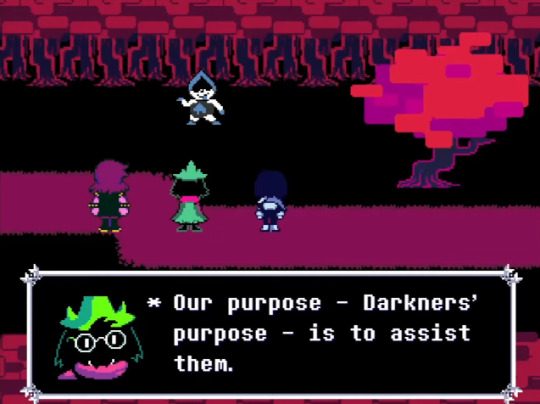
⠀⠀⠀⠀⠀⠀⠀⠀⠀⠀⠀⠀⠀⠀⠀⠀⠀⠀⠀
The way he behaved was incredibly off putting, making a large portion of the community think he’s secretly the villain and will have a heel turn in the story where he backstabs us all- but it turns out he hid information from us because he views the knowledge he has as a burden. He doesn't want us to know what he knows because he cares about us.
⠀⠀⠀⠀⠀⠀⠀⠀⠀⠀⠀⠀⠀⠀⠀⠀⠀⠀⠀
He’s okay with getting hurt, he’s okay with taking pain meant for us, protecting us from harm's way, because he doesn't yet view himself as a person worth protecting. He doesn't even view himself as a person.
When we learned this, suddenly all the oddities about him and the way he acted made sense. No one still believes he’s secretly evil.
⠀⠀⠀⠀⠀⠀⠀⠀⠀⠀⠀⠀⠀⠀⠀⠀⠀⠀⠀
Ramb is similar in a way. He views himself as a darkner, an object, first, and a person second. He exists for his lightner, the kid who gave him purpose as a toy, an item of play and fun.
⠀⠀⠀⠀⠀⠀⠀⠀⠀⠀⠀⠀⠀⠀⠀⠀⠀⠀⠀
He’s aware that in reality, he's just a power strip. and because he knows that while the lightners change, darkners don't, he understands that Kris views him as obsolete. He doesn't see himself as someone (something) worth saving.
His purpose, a darkners purpose, is to assist his lightner. His self proclaimed purpose is to let Kris have the fun they want. What he wants is irrelevant, he shouldn't even have needs or wants in the first place, there's no reason for it.

⠀⠀⠀⠀⠀⠀⠀⠀⠀⠀⠀⠀⠀⠀⠀⠀⠀⠀⠀
It's okay if he’s dying. It's okay if he’s already stone on the inside. He keeps setting up the levels in the console room because we keep coming back to play, because we’re having fun. Whatever Ramb wants doesn't matter as much as Kris's fun does.
⠀⠀⠀⠀⠀⠀⠀⠀⠀⠀⠀⠀⠀⠀⠀⠀⠀⠀⠀
While Ralsei thankfully has Susie and Kris by his side to constantly remind him that he matters, until the day he’ll hopefully fully believe it himself, Ramb is completely alone. He doesn't have anyone who cares about him, likes him, or would cry for him once he’s gone.
He hasn't yet realized, or maybe he’s never been told that he matters outside of his “role” as a darkner. And maybe he never will.
—--------
⠀⠀⠀⠀⠀⠀⠀⠀⠀⠀⠀⠀⠀⠀⠀⠀⠀⠀⠀
No one will shed a tear for him
⠀⠀⠀⠀⠀⠀⠀⠀⠀⠀⠀⠀⠀⠀⠀⠀⠀⠀⠀
This part may be a bit more speculative of me and not really something that's out right said, but it's important for me to mention
⠀⠀⠀⠀⠀⠀⠀⠀⠀⠀⠀⠀⠀⠀⠀⠀⠀⠀⠀
Before you finish the mantle game and Ramb disappears, if you hug the hall in front of where he guarded the door, you walk through a hidden hallway and enter his stand.
You can watch Susie and Ralsei play the game they were talking about, but you're unable to interact with them. Just watch as they’re having fun without you.
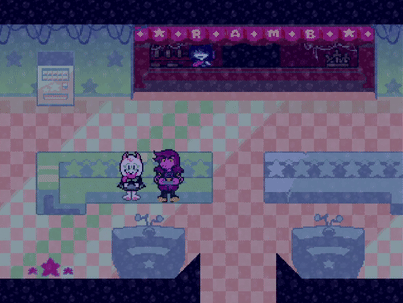
⠀⠀⠀⠀⠀⠀⠀⠀⠀⠀⠀⠀⠀⠀⠀⠀⠀⠀⠀
It's an adorable Susie and Ralsei moment that I'm glad we got, look at them go! It's nice to actually see the characters doing the things they say they do. But i think that maybe we got the option to walk here for another reason
⠀⠀⠀⠀⠀⠀⠀⠀⠀⠀⠀⠀⠀⠀⠀⠀⠀⠀⠀
This is Ramb’s point of view. His name is above where you stand. This is how he experiences the world. He's in the background, in the darkest area of the green room, looking at all the folks coming and going, laughing, smiling, bonding, while he’s unable to join.
⠀⠀⠀⠀⠀⠀⠀⠀⠀⠀⠀⠀⠀⠀⠀⠀⠀⠀⠀
Fully his own decision by the way, you can leave this room and go back to your adventures with your friends, he can leave his stand too.
Not that anyone is waiting for him to, though. So what's the point?
⠀⠀⠀⠀⠀⠀⠀⠀⠀⠀⠀⠀⠀⠀⠀⠀⠀⠀⠀
Loneliness is overwhelming. It's an all encompassing feeling that paints everything and everyone you see, and once it's got its talons in you, it begins to feel impossible to overcome.
Even at times where you could fight it and win, if it sunk in already, it may just feel pointless, and you chose to lose a winnable battle.
⠀⠀⠀⠀⠀⠀⠀⠀⠀⠀⠀⠀⠀⠀⠀⠀⠀⠀⠀
I doubt that in the entirety of Kris's house, there isn't a single darkner who would, at the very least, tolerate him. At best, genuinely like him and enjoy being his friend. But ramb knew loneliness in Cyber world, and its familiar sting found him in the Dreemurr house. Why try again?
⠀⠀⠀⠀⠀⠀⠀⠀⠀⠀⠀⠀⠀⠀⠀⠀⠀⠀⠀
it's not like he needs it from the other darkners anyway, right? After all, he has someone who likes him. His lightner likes him, and that's more than enough.
⠀⠀⠀⠀⠀⠀⠀⠀⠀⠀⠀⠀⠀⠀⠀⠀⠀⠀⠀
It's okay if they've not seen each other in years. It's okay if they never will again after the fountain is sealed. He has fulfilled his purpose in making sure they're happy.
That's more than enough. Nothing matters more than their happiness, not even him.
—-----
⠀⠀⠀⠀⠀⠀⠀⠀⠀⠀⠀⠀⠀⠀⠀⠀⠀⠀⠀
So let's walk through what we can assume his life was like;
⠀⠀⠀⠀⠀⠀⠀⠀⠀⠀⠀⠀⠀⠀⠀⠀⠀⠀⠀
He arrived at the library, as the only European plug there. Maybe he was accidentally purchased by someone who didn't notice that he had a socket type that they couldn't use with the rest of the plugs there.
He couldn't bond with any object in the library because he wasn't compatible with them, maybe they just didn't get along or the conversations didn't flow. No one there really cared about him, and he remained alone.
⠀⠀⠀⠀⠀⠀⠀⠀⠀⠀⠀⠀⠀⠀⠀⠀⠀⠀⠀
Then, one day, a monster and a human decided to take him and bring him home with them.
⠀⠀⠀⠀⠀⠀⠀⠀⠀⠀⠀⠀⠀⠀⠀⠀⠀⠀⠀
The human treated him like any one of their toys, and they played with him. He assisted them in having fun. He felt wanted, appreciated, useful, this was the first time in his life that he felt loved. He finally had a purpose.
⠀⠀⠀⠀⠀⠀⠀⠀⠀⠀⠀⠀⠀⠀⠀⠀⠀⠀⠀
The other objects in this house just didn't get it, did they? this wonderful human was kind enough to give himself and all of them a home, they should be everyone's priority!
He tried to get them to focus their efforts on making the human happy, but nothing they ever did was good enough for them, he felt like he was the only one that really knew them, the only one who cared.
⠀⠀⠀⠀⠀⠀⠀⠀⠀⠀⠀⠀⠀⠀⠀⠀⠀⠀⠀
The other objects started to get sick of him. and while they adjusted to their new life here just fine, finding friends and things to do, a place for themselves, he didn't. Again, he couldn't make a single friend.
He stuck to his beliefs, never questioning himself; if caring for my lightner is what got me to this point, then I don't regret it for a second. The one person who ever loved him deserves the best the world has to offer. He did not flinch when, from within, slowly, he began to turn to stone.
⠀⠀⠀⠀⠀⠀⠀⠀⠀⠀⠀⠀⠀⠀⠀⠀⠀⠀⠀
The human grew up, and stopped playing with toys. Ramb continued his life as it was before, always thinking of his lightner, wondering how they're doing.
Until, one day, he saw them opening a dark fountain.
⠀⠀⠀⠀⠀⠀⠀⠀⠀⠀⠀⠀⠀⠀⠀⠀⠀⠀⠀
His lightner is back! What joy! The one person who ever loved him, the one who gave him purpose, is right here!
He wondered why they opened a fountain right now, maybe it was fun that they were missing? And with the mind-numbing games his boss is making them play they're not getting any fun anytime soon.
⠀⠀⠀⠀⠀⠀⠀⠀⠀⠀⠀⠀⠀⠀⠀⠀⠀⠀⠀
So he decided to fulfill his purpose. He set up the game that Tenna changed into that snooze-fest. The original version. The kind of game where you get choices. The story isn't linear, you can fight your way to the ending, or make friends that carry you through it.
(not that he knew of the controller he set up disappearing, and a corrupted one being left in the hallway by someone else)
⠀⠀⠀⠀⠀⠀⠀⠀⠀⠀⠀⠀⠀⠀⠀⠀⠀⠀⠀
But if they choose not to play the game, that’s fine too. If they actually are having enough fun on Tenna’s game show, then that's fine. He won't force them to play his game, his purpose is to make sure Kris is having fun, not to be the fun they have.
⠀⠀⠀⠀⠀⠀⠀⠀⠀⠀⠀⠀⠀⠀⠀⠀⠀⠀⠀
But if they do want to play his game? He’ll make sure they can until his very last moment. As he’s fully turning to stone, he doesn't care. His personhood doesn't matter, it never did. The only thing of value he has ever done was assist his lightner in their fun, way back when.
⠀⠀⠀⠀⠀⠀⠀⠀⠀⠀⠀⠀⠀⠀⠀⠀⠀⠀⠀
He just wants them to have the fun they deserve, again.
—--------
⠀⠀⠀⠀⠀⠀⠀⠀⠀⠀⠀⠀⠀⠀⠀⠀⠀⠀⠀
That's who he is in the story of chapter 3. A lonely darkner stuck in the past, who gives himself up for you to be able to have the fun you used to have, the fun you had back when he was useful, unwilling to move on from when he was loved by you.
⠀⠀⠀⠀⠀⠀⠀⠀⠀⠀⠀⠀⠀⠀⠀⠀⠀⠀⠀
In a more meta sense though, he was also the perfect secret boss red herring;
A lonely, abandoned toy, with unexplored thoughts and feelings about his worth as a toy and what he means in the grand scheme of things. Seeing him in this chapter was supposed to make us believe, because of past experiences with these types of guys in this game, that he’ll be the secret boss.
But he wasn't, that’s a part of his character of being forgotten, and it's intentional.
--------------
⠀⠀⠀⠀⠀⠀⠀⠀⠀⠀⠀⠀⠀⠀⠀⠀⠀⠀⠀
Okay, so he's not the secret boss, he's not Eram, and he was written to just be a red herring.
That's all he is in this story.
⠀⠀⠀⠀⠀⠀⠀⠀⠀⠀⠀⠀⠀⠀⠀⠀⠀⠀⠀
Right?
------------------------------------------------------------------------------
He's just a red herring, right? (well…)
⠀⠀⠀⠀⠀⠀⠀⠀⠀⠀⠀⠀⠀⠀⠀⠀⠀⠀⠀
Then:
Why did we need to know so much about him?
Why isn't he in castle town?
Why doesn't he fully turn to stone?
Why was it important that we know he saw Kris make the fountain?
Why was it important to imply that something happened to him after the sword route?
…Why doesn't the knight make the air crackle with freedom?
⠀⠀⠀⠀⠀⠀⠀⠀⠀⠀⠀⠀⠀⠀⠀⠀⠀⠀⠀
----------
⠀⠀⠀⠀⠀⠀⠀⠀⠀⠀⠀⠀⠀⠀⠀⠀⠀⠀⠀
Why did we need to know so much about him?
Beyond being a red herring, we learn so much about him as a character that doesn't go anywhere. Like his story was supposed to be something but got cut short.
Imagine if after Spamton gave you all this weird information in his shop, he turned to stone and THEN all the Addisons would show up and talk about him. It feels empty, like something was meant to be there, alongside all the information. some big break or moment that would give the character we slowly learned about over the course of the chapter closure.
⠀⠀⠀⠀⠀⠀⠀⠀⠀⠀⠀⠀⠀⠀⠀⠀⠀⠀⠀
If he truly isn't and wasn't meant to be anything significant, then why are we given so much information on him? Why are we being made to wonder about him? Why are we being made to care?
⠀⠀⠀⠀⠀⠀⠀⠀⠀⠀⠀⠀⠀⠀⠀⠀⠀⠀⠀
Even in runs where you don't play the mantle games, and all Ramb was to you was the funny little guy giving you prizes in the green room, you end up getting so much information about him out of nowhere. I know first time players that were genuinely weirded out by it- why is it there by a point where his importance really wouldn't matter to you??
⠀⠀⠀⠀⠀⠀⠀⠀⠀⠀⠀⠀⠀⠀⠀⠀⠀⠀⠀
But that could be a part of him being a red herring, we're learning about him as a character and thinking “oh this guy is absolutely the secret boss”, then the twist is that he isn't.
And that's true! That seems to be the idea Ramb was created for. But I wouldn't write all this if there wasn't more
⠀⠀⠀⠀⠀⠀⠀⠀⠀⠀⠀⠀⠀⠀⠀⠀⠀⠀⠀
⠀⠀⠀⠀⠀⠀⠀⠀⠀⠀⠀⠀⠀⠀⠀⠀⠀⠀⠀
Why isn't he in castle town?
We didn't get too many unique characters in chapter 3; Tenna, Lanino, Elnina, Shuttah, and Ramb are really the only significant ones, they all even show up at the beginning of the chapter before the first board.
Ramb is one of the 5 unique characters we got in chapter 3, they're all in castle town, except him, no matter if we do the sword games or not. there was no reason not to put him there and give him like 2 lines of unremarkable dialogue.
⠀⠀⠀⠀⠀⠀⠀⠀⠀⠀⠀⠀⠀⠀⠀⠀⠀⠀⠀
Spamton was a unique character in chapter 2, but he doesn't show up in castle town either, even if we don't fight him as spamton neo.
⠀⠀⠀⠀⠀⠀⠀⠀⠀⠀⠀⠀⠀⠀⠀⠀⠀⠀⠀
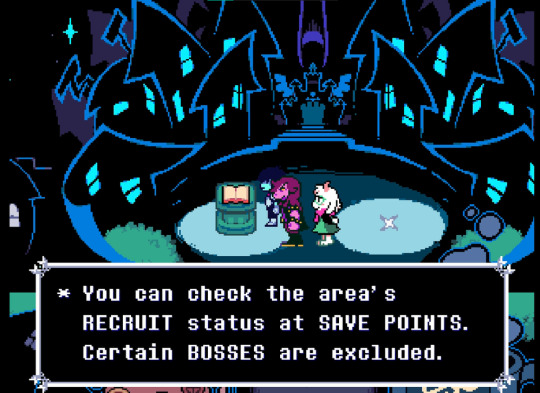
⠀⠀⠀⠀⠀⠀⠀⠀⠀⠀⠀⠀⠀⠀⠀⠀⠀⠀⠀
“certain bosses are excluded.” as if Ramb was meant to be something he ended up not being.
⠀⠀⠀⠀⠀⠀⠀⠀⠀⠀⠀⠀⠀⠀⠀⠀⠀⠀⠀
⠀⠀⠀⠀⠀⠀⠀⠀⠀⠀⠀⠀⠀⠀⠀⠀⠀⠀⠀
Why doesn't he fully turn to stone?
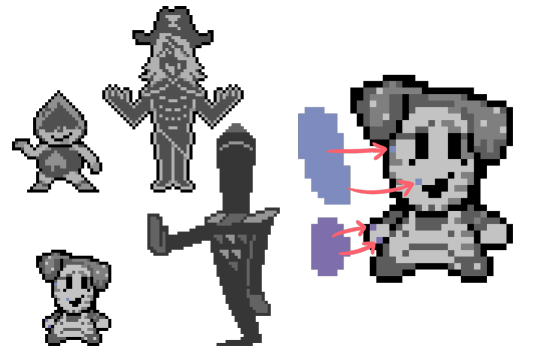
(original image by @/unikhroma)
⠀⠀⠀⠀⠀⠀⠀⠀⠀⠀⠀⠀⠀⠀⠀⠀⠀⠀⠀
If it was just 1 pixel I wouldn't mention it, if it was two I'd be surprised that the flood fill tool the deltarune team is using is so uncooperative. If it was three I'd raise an eyebrow but not proclaim anything.
It's four. It's four uncolored, obvious pixels on his petrified sprite??? One of them is a part of his mouth and very visible????
⠀⠀⠀⠀⠀⠀⠀⠀⠀⠀⠀⠀⠀⠀⠀⠀⠀⠀⠀
Not to mention how his eyes are still black like they were before- when lancer turns to stone, the big spade on his face that acts as an expressive mask of sorts turns gray like the rest of him, making him look much more like a statue.
But ramb looks awake, just frozen and grayscale. (I find it interesting that in his half stone sprite his left eye is obscured in shadow, would it be black or gray?)
⠀⠀⠀⠀⠀⠀⠀⠀⠀⠀⠀⠀⠀⠀⠀⠀⠀⠀⠀
And why is it that when we interact with him behind his stand, instead of getting “Some kind of stone statue”, we get blocked by the pippins, as if when we’d interact with it we wouldn't get that description?
⠀⠀⠀⠀⠀⠀⠀⠀⠀⠀⠀⠀⠀⠀⠀⠀⠀⠀⠀
Why was there a need to imply he's still conscious? Why did we need to wonder if he heard everything that was said about him?
⠀⠀⠀⠀⠀⠀⠀⠀⠀⠀⠀⠀⠀⠀⠀⠀⠀⠀⠀
⠀⠀⠀⠀⠀⠀⠀⠀⠀⠀⠀⠀⠀⠀⠀⠀⠀⠀⠀
Why was it important that we know he saw Kris make the fountain?
While it is very possible that other characters are aware that Kris made the fountain- even Tenna, who's the ruler of this dark world, doesn't outright call Kris their creator.
For some reason, this little british guy, supporting cast member no.5, is the only darkner as of yet, in the entire first half of the game, to knowingly speak with their creator on screen, and outright say they saw them make the fountain.
Why him? Why now? Why no one else?
⠀⠀⠀⠀⠀⠀⠀⠀⠀⠀⠀⠀⠀⠀⠀⠀⠀⠀⠀
⠀⠀⠀⠀⠀⠀⠀⠀⠀⠀⠀⠀⠀⠀⠀⠀⠀⠀⠀
Why was it important to imply that something happened to him after the sword route?
When we exit the console room after getting the shadow mantle, Ramb is gone. He could've been outside as he was before, just fully turned to stone and giving the same prompt of “Some kind of stone statue”. But sure, maybe he's gone for tonal reasons. We leave right after the scene with Susie after all.
⠀⠀⠀⠀⠀⠀⠀⠀⠀⠀⠀⠀⠀⠀⠀⠀⠀⠀⠀
But it was so important to Toby that we know Ramb didn't just walk away off screen or disappear without a reason, that he gave the dust bunny in the s rank room a unique shocked sprite so we’d know to talk to it.
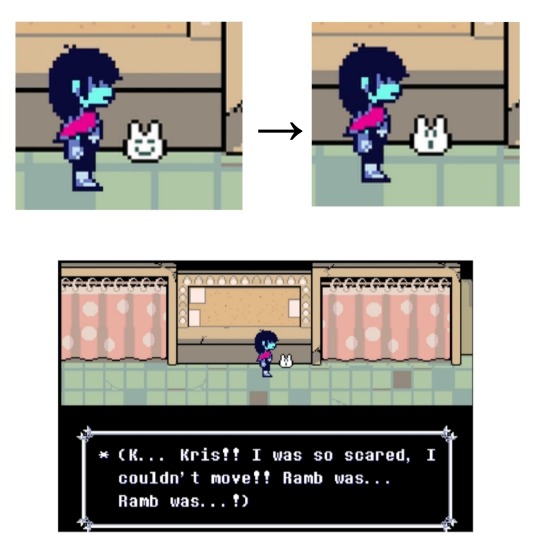
⠀⠀⠀⠀⠀⠀⠀⠀⠀⠀⠀⠀⠀⠀⠀⠀⠀⠀⠀
“I was so scared, Ramb was..” doesn't tell us much. Did something scary happen to him? Did he do something that scared them?
And why do we need to think about that in the first place? Isn't he supposed to just be an irrelevant statue by this point? Why was it important enough to be told to us?
⠀⠀⠀⠀⠀⠀⠀⠀⠀⠀⠀⠀⠀⠀⠀⠀⠀⠀⠀
⠀⠀⠀⠀⠀⠀⠀⠀⠀⠀⠀⠀⠀⠀⠀⠀⠀⠀⠀
Why doesn't the knight make the air crackle with freedom?
Think about it. When spamton turns into the dealmaker/puppet scarf he becomes a little glimmer and falls down to us, and we get both the item he turned into and the shadow crystal he held.
The part that chipped off the knight's sword was the Black Shard, not the shadow crystal. They were just holding it, it wasn't a part of them.
⠀⠀⠀⠀⠀⠀⠀⠀⠀⠀⠀⠀⠀⠀⠀⠀⠀⠀⠀
And, they don't have the freedom motif in their theme…
And “The air crackles with freedom” doesn't show up during their fight…
and they’re an unavoidable battle, unlike Jevil, Spamton, or Gerson.
And… They’re repeatedly said to have arrived late. Almost as if, if they had arrived in time, and Tenna wouldn't have had to stall the show so much, they could do what they came to do, whatever that was.
⠀⠀⠀⠀⠀⠀⠀⠀⠀⠀⠀⠀⠀⠀⠀⠀⠀⠀⠀
The knight didn't mean for things to happen the way they did!
⠀⠀⠀⠀⠀⠀⠀⠀⠀⠀⠀⠀⠀⠀⠀⠀⠀⠀⠀
I think the implication is that, if the knight wasn't late, one of the probable many dastardly activities it would be up to, would be to give Ramb the shadow crystal it was holding.
Interesting too that their plan this chapter is prophesied to fail (lord of screens, cleaved red by blade), while we're trying to break the prophecy.
⠀⠀⠀⠀⠀⠀⠀⠀⠀⠀⠀⠀⠀⠀⠀⠀⠀⠀⠀
If the prophecy was broken this chapter and the knight did all they wanted perfectly, would we have fought Ramb?
--------------
⠀⠀⠀⠀⠀⠀⠀⠀⠀⠀⠀⠀⠀���⠀⠀⠀⠀⠀
You might notice that most of these end with questions, and that's the point. We're not being told everything there is to know. For some reason, we're being made to ask questions.
⠀⠀⠀⠀⠀⠀⠀⠀⠀⠀⠀⠀⠀⠀⠀⠀⠀⠀⠀
I'll be honest, if you make some assumptions you could probably find answers to most of these, but I can't, even with assuming things like; he's Eram, or he's truly not someone we're meant to care for- (those cancel each other out btw) Find an explanation to everything.
If you figure out an answer to one, another falls apart.
⠀⠀⠀⠀⠀⠀⠀⠀⠀⠀⠀⠀⠀⠀⠀⠀⠀⠀⠀
And I'm not trying to find the answers to these questions, I'm just pointing them out, because for an irrelevant side character those are a shit ton of loose ends. That's what's weirding me out! Why are we being made to ask questions about someone who's made to be insignificant??
⠀⠀⠀⠀⠀⠀⠀⠀⠀⠀⠀⠀⠀⠀⠀⠀⠀⠀⠀
This isn't a Mike situation where the answer was just “we don't know” and a pun about “real mike” (brilliant, btw)
Mike was a question for years at this point, but he had no answer because there wasn't meant to be one, we made the question of “who's mike” up!!
⠀⠀⠀⠀⠀⠀⠀⠀⠀⠀⠀⠀⠀⠀⠀⠀⠀⠀⠀
But with Ramb we're given the character and the questions at the same time, something is being built, but there's no way for us to know what right now. For now we just have the questions.
⠀⠀⠀⠀⠀⠀⠀⠀⠀⠀⠀⠀⠀⠀⠀⠀⠀⠀⠀
Isn't he a cryptic shopkeeper and that's it?
Not really? he doesn't have a shop menu, there's no option to sell him anything, there's no extended talk option, and you can't even buy anything from him and it's being pointed out in game;
“Gotta use that vending machine though, Tenna doesn't like us… touching the points.”
“Mixing drinks for himself, he wasn't allowed to handle the points”
⠀⠀⠀⠀⠀⠀⠀⠀⠀⠀⠀⠀⠀⠀⠀⠀⠀⠀⠀
He's the least shopkeeper a shopkeeper ever was. Even the old man in chapter 4 had a more proper shop.
--------
Alright, so he’s a shopkeeper narratively, not literally. the Seam to Jevil, Swatch for Spamton.
Is he Eram’s shopkeeper?
⠀⠀⠀⠀⠀⠀⠀⠀⠀⠀⠀⠀⠀⠀⠀⠀⠀⠀⠀
Seam hinted at Jevil’s existence the very first time we met them, they gave us a part of the key to his cell, and once we beat him they expanded on his story and downfall.
⠀⠀⠀⠀⠀⠀⠀⠀⠀⠀⠀⠀⠀⠀⠀⠀⠀⠀⠀
Swatch hinted at someone stealing their look, breaking into the mansion, they shush you up if you bring up the basement. And after you beat spamton, they tell you what they knew of him, and how they saw everything as it went wrong.
⠀⠀⠀⠀⠀⠀⠀⠀⠀⠀⠀⠀⠀⠀⠀⠀⠀⠀⠀
Ramb didn't know Eram existed. He didn't understand why Kris thought someone was in the back with them, he didn't see anyone come in.
In Ramb's mind he just gave Kris a classic NES game like the ones they played as a kid, where you can go around with your sword and level up, or play peacefully, completing side quests and talking to the characters.
⠀⠀⠀⠀⠀⠀⠀⠀⠀⠀⠀⠀⠀⠀⠀⠀⠀⠀⠀
With how much he cares about kris, it's obvious he had no idea there would be a harmful taunting creature in there, calling their name and changing the game to give them a worse time, he didn't have to tell us that to his knowledge no one was back there with them, but he still did.
Sometimes things should be taken at face value.
⠀⠀⠀⠀⠀⠀⠀⠀⠀⠀⠀⠀⠀⠀⠀⠀⠀⠀⠀
The shopkeepers to secret bosses dynamic seems to exist so that we could learn more about the secret bosses stories and about them as characters. We've seen two instances where the shopkeeper and the secret boss knew each other, but because they're there just to give us more information on them, then they don't really have to.
⠀⠀⠀⠀⠀⠀⠀⠀⠀⠀⠀⠀⠀⠀⠀⠀⠀⠀⠀
Ramb could’ve given us information in a backwards way, saying things that include game or lore hints that would make sense to us but still show that he has no idea he's filling the role of a guide.
(think about Noelle's line in chapter 4; “we’ll know it's there if it makes noise.” she didn't know the soul was in the closet, she didn't know she was giving the player a hint! She was just telling Susie that if they heard a mouse squeak or something then they’ll know it entered Dess’s room.)
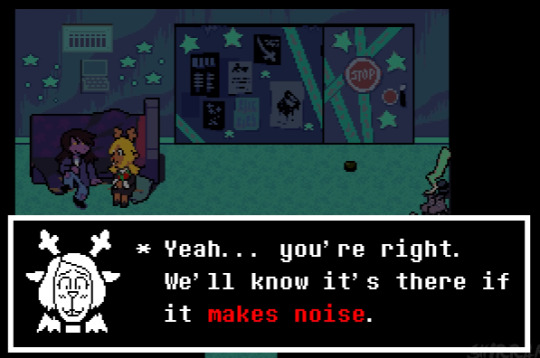
⠀⠀⠀⠀⠀⠀⠀⠀⠀⠀⠀⠀⠀⠀⠀⠀⠀⠀⠀
And yet Ramb wasn't even that! We didn't learn anything about Eram from him, even after reading all his lines of dialogue about the game!!!
Ramb is not the battleable secret boss obviously, but he’s not even the shopkeeper to one!
------------------------------------------------------------------------------
⠀⠀⠀⠀⠀⠀⠀⠀⠀⠀⠀⠀⠀⠀⠀⠀⠀⠀⠀
What he is in this story, and will he be more? (Conclusion)
⠀⠀⠀⠀⠀⠀⠀⠀⠀⠀⠀⠀⠀⠀⠀⠀⠀⠀⠀
So… what is he supposed to be? Is he just a red herring? Is his only purpose in this story to throw us off and be a part of this chapter’s expectation subversion?
So why the loose ends? Why the information?
⠀⠀⠀⠀⠀⠀⠀⠀⠀⠀⠀⠀⠀⠀⠀⠀⠀⠀⠀
Like I said before, deltarune is not meant to be predicted. It can't be! Whatever all of this was for, if it was for anything, what it will be, when it will be and how, it's all up to toby.
⠀⠀⠀⠀⠀⠀⠀⠀⠀⠀⠀⠀⠀⠀⠀⠀⠀⠀⠀
Originally, I wanted to bring up a theory I really believe in about the future of deltarune. If you're familiar with mollystars’ “the device theory”, you'll know all about it. New-game-plus.
⠀⠀⠀⠀⠀⠀⠀⠀⠀⠀⠀⠀⠀⠀⠀⠀⠀⠀⠀
(In short, it's about how currently we're playing by the prophecy, (think of it as a flawed undertale neutral run), and once we reach the end of deltarune, we could break the prophecy, and have an extra epilogue chapter, or play the whole game again, and have a timeline where the prophecy is broken. (like resetting a neutral undertale ending and playing pacifist))
(watch the device theory trilogy on yt if you're interested, it's awesome and like 10 and a half hours long.)
⠀⠀⠀⠀⠀⠀⠀⠀⠀⠀⠀⠀⠀⠀⠀⠀⠀⠀⠀
At first, this theory had a whole segment here, explaining it at length, and why ramb seems to fit it perfectly-
But… I decided not to do that. Sure, Ramb’s weird existence kinda does make me think about the new game plus theory, but… no. I'm not gonna assume anything more about him.
⠀⠀⠀⠀⠀⠀⠀⠀⠀⠀⠀⠀⠀⠀⠀⠀⠀⠀⠀
We were given the character, then the questions. We can rack our brains trying to find the answers and feel as confident about them as we can be, but we were so off about Tenna before the chapters came out you guys.
⠀⠀⠀⠀⠀⠀⠀⠀⠀⠀⠀⠀⠀⠀⠀⠀⠀⠀⠀
A lot of people tend to dismiss Ramb as just another character in this chapter that happened with nothing much more to him.
⠀⠀⠀⠀⠀⠀⠀⠀⠀⠀⠀⠀⠀⠀⠀⠀⠀⠀⠀
The purpose of this essay, alongside compiling the information about Ramb and analyzing it and his character, was to point out and bring attention to the questions that his odd existence in this chapter raises, not try to answer them.
just show how strange it is that this character, that's supposed to be a red herring and nothing more, has this many questions regarding him, his existence in this story, and his unclear end.
⠀⠀⠀⠀⠀⠀⠀⠀⠀⠀⠀⠀⠀⠀⠀⠀⠀⠀⠀
Something is being planned here, and we have no way of knowing what.
All we can do is sit with this character, the questions, the loose ends, the clues … and wonder.
⠀⠀⠀⠀⠀⠀⠀⠀⠀⠀⠀⠀⠀⠀⠀⠀⠀⠀⠀

------------------------------------------------------------------------------
⠀⠀⠀⠀⠀⠀⠀⠀⠀⠀⠀⠀⠀⠀⠀⠀⠀⠀⠀
Posts i used as a reference, or influenced my view on things, or are just awesome to read if you want more Ramb:]
⠀⠀⠀⠀⠀⠀⠀⠀⠀⠀⠀⠀⠀⠀⠀⠀⠀⠀⠀
What's the Deal with Ramb? - by koimethehorizon:
⠀⠀⠀⠀⠀⠀⠀⠀⠀⠀⠀⠀⠀⠀⠀⠀⠀⠀⠀
Why it's important that ramb isn't an American plug - by Askerror87’s;
⠀⠀⠀⠀⠀⠀⠀⠀⠀⠀⠀⠀⠀⠀⠀⠀⠀⠀⠀
We are Studying Ramb Again - by lost-seal:
⠀⠀⠀⠀⠀⠀⠀⠀⠀⠀⠀⠀⠀⠀⠀⠀⠀⠀⠀
Thinking about ramb by meatcarnival3000:
⠀⠀⠀⠀⠀⠀⠀⠀⠀⠀⠀⠀⠀⠀⠀⠀⠀⠀⠀
RAMB VS ERAM - by frankent1ts:
⠀⠀⠀⠀⠀⠀⠀⠀⠀⠀⠀⠀⠀⠀⠀⠀⠀⠀⠀
Ok, we need to talk about Ramb - by todaslocas:
⠀⠀⠀⠀⠀⠀⠀⠀⠀⠀⠀⠀⠀⠀⠀⠀⠀⠀⠀
(Short but really influenced how I think about Ramb and Tenna's relationship!) - by meatcarnival3000:
⠀⠀⠀⠀⠀⠀⠀⠀⠀⠀⠀⠀⠀⠀⠀⠀⠀⠀⠀
Ramb tenna lore Supercut - by unikhroma:
⠀⠀⠀⠀⠀⠀⠀⠀⠀⠀⠀⠀⠀⠀⠀⠀⠀⠀⠀
thank you for reading! <3
⠀⠀⠀⠀⠀⠀⠀⠀⠀⠀⠀⠀⠀⠀⠀⠀⠀⠀⠀
#deltarune#deltarune chapter 3#ramb#deltarune ramb#ramb deltarune#deltarune theory#deltarune analysis#what more tags can i add lol.#if theres any segment you read from this please read “red flags 2 (the red stands for is he okay)” its my favorite one#this was a labor of love#i was worried that how much i worked on this would make me start disliking ramb#too much of a good thing y'know#but no. im just excited to share this with people. my best attempt at wording why he plagues my thoughts#im so happy i managed to post it this weekend. im gonna have no free time this entire month-#ive actually still got some drawings i wanna post but theyre not done yet. ill see how much i can get done today before i go radio silent#if there are any grammatical errors please ignore them <3 im just a little guy#if you take the time to read this entire behemoth i literally cannot thank you enough. ur aWESOME <3333333#please take breaks tho if youre planning on doing that#:'] <33#alright thats it no more stalling posting this by writing tags#i hope you enjoy! <3
193 notes
·
View notes
Text
Random Musings on Gale and His Relationship With Mystra
I find Gale's relationship with Mystra to be one of the most fascinating parts of his story. It’s a dynamic that can be viewed in many different ways, depending on how you approach it and I think that’s part of what makes it so compelling. While some might see it literally, I’d like to explore it through a more allegorical perspective, though I want to be clear: this is just one way to interpret their relationship, and other viewpoints are just as valuable. This isn't even the only way that I personally interpret them haha. (I just have to be nuanced, it's a compulsion truly.)
In literature and mythology, take Greek mythology, for instance, relationships between gods and mortals can often carry deeper, symbolic meanings. The gods aren’t always just powerful beings they can represent larger forces like nature, fate, or human desires. This approach, called allegorical interpretation, is something I find really enjoyable! It adds layers to a story.
Consider the famous story of Paris’s judgment of the goddesses. The goddess Eris, seeking to sow discord, throws a golden apple inscribed “for the fairest” into a wedding attended by Athena, Hera, and Aphrodite. They decide to have the mortal Paris judge who deserves the apple most out of the three of them and is thus the fairest.

Each goddess offers Paris a gift in exchange for the title. Athena offers great tactical ability, Hera promises leadership over vast kingdoms, and Aphrodite tempts him with the love of Helen, the most beautiful woman in the world (who happens to already be married). Paris chooses Aphrodite, gains Helen as a lover and this leads to the Trojan War. Beyond the literal reading, this story can be seen as desire (Aphrodite) overcoming both wisdom (Athena) and marriage (Hera). Paris's fatal flaw is his lust for Helen. The story can also be interpreted as Paris losing due to declining to accept both of the other offers. He fails strategically in the ensuing war and also causes the collapse of his own kingdom.
Mystra, as the living incarnation of the Weave, can be interpreted similarly. She isn’t merely Gale's ex-lover. She is magic itself, the force that gives Gale his entire identity. Their relationship transcends romance; it’s more like that of a man consumed by his craft to an unhealthy degree. Like a mathematician to mathematics, or a physicist to physics, he's in love with something that can't love him back.

His attempt to give Mystra a gift she's never received before, something truly incredible, is due to his belief that transcending all limits to somehow earn Mystra’s (and thus, magic’s and his life's work's) recognition is both possible and necessary. It was 100% done with the best intentions but tragically any all-consuming passion carries the risk of blowing up in your face. (Just look at Alfred Nobel, pun intended) And, due to the aforementioned "blow up", his emotional low and his measurable low in his abilities correspond quite directly
There is a cut dialogue from early access about how much of his power he lost after this:
You see, this fire – there was a time that I could make it come alive. That it would take the shape of a dragon and roar in delight. There was a time I could silence a Beholder with a word, and lift a tower from its foundations with a flourish. There was a time I was all but one with the Weave. But no more – a mere shadow of the wizard I used to be. Why? Because I’ve lost.
A key theme in their relationship (in my opinion) is not just Mystra’s rejection but what her rejection represents: The collapse of Gale’s identity as a powerful magic user. (An identity he's built his life around and sacrificed for ever since he was a child)
Without this, he starts self destructing. He has to make do with consuming scraps of magic rather than the all encompassing sort he used to receive from Mystra's presence.
------------------------------------------------------------------------------
While Mystra’s treatment of Gale is undeniably harmful, I think it’s important to recognize that she is not cruel in a personal, calculated way. She is so out of touch with normal people that she’s more akin to a force of nature. As an arbiter of natural laws, she wants to control him/kill him because he represented a destabilizing influence, not out of any targeted animosity. (Which is arguably worse than outright hate depending on your point of view)
------------------------------------------------------------------------------
Now for a bit of a change in topic I wanted to go over his different endings:
His "good" ending comes from the realization that magic, or any external force, cannot be the source of true self-worth. The deeper theme here, beyond just getting over an ex-relationship, is that Gale must learn to build relationships with people and and find a healthy balance between his work and personal life, rather than devoting himself wholly to impersonal things at the cost of his well-being. He has to learn that he is "Galenough," as @ekansbot once put it. Ultimately, his growth in this regard is best shown with his choice to embrace his ordinary, human last name "Dekarios", rather than defining himself solely as the archmage "of Waterdeep."

------------------------------------------------------------------------------
More evidence about the meaning of names to him, earlier during the conversation with Mystra in the tabernacle, she will either call him "Gale Dekarios" if she's displeased to remind him of his humanity, or"Gale of Waterdeep" when pleased to inflate his ego with a title. This shows how revolutionary it is for him to willingly forego having a title at all in this ending as it had been something he sought in the past.
------------------------------------------------------------------------------

Alternatively, and more fun for my tragedy-loving psyche, he can totally succumb to his flaws and lose himself. In this case the orb's desires fully supplant him as a person. He becomes a power hungry god, doomed to perpetuate the same callousness Mystra showed to him. His grand dreams of bettering the world fades, and his only goals shift to slowly gathering more power and followers and eventually challenging the rest of the gods. He entirely gives up on being a "person" he's the god of ambition now, and you can see it in the way he speaks how much he has mentally separated himself from the mortal world. He has fully given up on having a life outside of his obsessions. It’s quite dark. (Though not quite as dark as my absolute favorite, the Absolute ending, where you use thousands of mind controlled innocents to become Kratos.)
------------------------------------------------------------------------------
Something that's extra sad for you. If the player character chooses to break up with him after becoming a god he says "so I'm still not enough for you" Aghh it's horrible. His insecurities only get worse as a god.
------------------------------------------------------------------------------

Or... he could kill himself. Literally destroying his darker hungers (the orb) for an altruistic purpose, but he also, obviously, destroys himself in the process. Very sad indeed.
Now, here’s something I find fascinating:
If Gale chooses not to use the crown, nor to surrender it to Mystra, but instead lets it remain in the water, the orb stays within him but rather than being a catastrophe it actually becomes harmless and inert.
Why does this happen? Gale speculates that it's because he has found contentment due to the player character's romance with him.
Clip sourced from this video: https://youtu.be/gikRKEIpvQs
This reveals something crucial: the orb, from the very beginning, was tied to his own emotions. It was basically an extension of him all along. He was inadvertently the one driving the orb’s power. It was his own despair and obsession that were indirectly killing him the entire time! It's very tragic but also supremely interesting!
It is this somewhat gut wrenching realization, though, that makes this the best "good" ending. He doesn't have to apologize to Mystra to get a happy ending out of pity. Instead, it is his own emotional catharsis that resolves the problem of the orb internally, rather than it being fixed through external means. It also has a sort of Jungian quality to it that I really like. With the idea of integrating and accepting all parts of oneself (allowing the orb to remain, but becoming settled and integrated), rather than trying to shed them being a theme I think fits his character well. Additionally, he keeps the orb scar, which looks pretty neat. :)
#bg3#gale dekarios#gale of waterdeep#mystra#character analysis#i like the endings where he gets worse the best but that's just because i'm sick and twisted😔#his absolute ending is just really good ty larian for the evil update#hope you enjoyed my screenshots as well#when people do real world au's of gale and mystra the general way most go about it is to have her be a boss or something along those lines#this is cool!#but what i personally would do if i wanted it to align with this interpretation more#is to have her be a disembodied research project or general obsession that consumes his life#this is a bit rambly my apologies#i've already been editing it for so long i'm just going to release it into the world to be free
287 notes
·
View notes
Text
iwtv + race, briefly dissected by intellectuals



#iwtv#interview with the vampire#iwtv spoilers#sometimes I do enjoy Twitter#iwtv analysis#I plan on keeping these in a safe so I can go back and read them later#fav#iwtv twitter
798 notes
·
View notes
Text
To be honest I think that a lot of people who share the anti Jason Todd sentiment don't even actually hate Jason. I think a lot of them hate what he forces the narrative to do.
Jason forces the subversion of the hero genre -- he's the single, most extreme proof that Batman's hero fantasy wouldn't be effective in real life, and therefore Jason showing up can take you out of the universe really fast really hard. A lot of people are here for what comics are meant to offer, the one man hero fantasy that makes you Feel Good, and Jason showing up doesn't Allow you to enjoy it! And if that's the case, you're completely justified in not liking Jason, he takes you out of the thing you enjoy.
I think a lot of you don't actually find his personality or acts annoying in of themselves, you just hate what those actions do to the genre itself. And I think once you realize that and start looking at comics like actual pieces of literature, Jason and shitty comics both will become a lot less rage inducing to you.
#i think thats the reason why a lot of people who enjoy characters who in universe are a LOT like jason#like helena and tara and even midnighter to an extent#still end up hating him#because Jason functions differently in the meta sense in a way they dont wnjoy#*enjoy#but because nobody ever views comics as pieces of literature this doesnt actually get discussed#so they figure they must just find jasons personality annoying#when its actually a completely different thing that is frustrating them#ramble ramble ramble#dc comics#batman#jason todd#meta analysis
169 notes
·
View notes
Text
To be completely honest, I don't really think Kai will become a centipede monster. I knowww it's sad but my reason as to why is pretty agreeable I think.
Usually, whenever a character is transformed into a monster or just a non-human in general, it's always been about accepting and overcoming parts of yourself youd rather hide. When Zane was revealed to be a nindroid, he learned that the others would accept him as their brother no matter what, and soon enough, it became a strength for him. Literally, he gained his true potential shortly after. He no longer sees him being a nindroid separate to his identity. He went from Zane, a ninja, to Zane, the titanium ninja. He's still him, always will be, just shiny :)
When Jay was turned into a Venomari, it became a reflection of his insecurities, the parts of himself he tries to mask with flashy bravado and exaggerated stories, especially around Nya, who he had a massive crush on. It ended similarly to Zane, where Nya said he would accept him no matter what. Flaws and all. Knowing this, He was able to gain his true potential too. Realizing that being himself was far better than covering it up with glitter and foundation.
Then when Cole became a ghost, it was a tragedy. He no longer felt like himself, no longer saw himself as a person. Instead a living husk of his former glory. But, with the encouragement and unyielding support of his teammates, his family, he learned to accept this new body of his, as inhuman as it was. It symbolized trauma, and the strength it takes to see the good in every bad situation. It carries later into the show, where even though he's back to being a human, the scars are still there. They will never truly go away, but he learned to accept himself as himself, weird ghost scars and all.
Lloyd is the definition of grappling with identity. From being the son of Lord Garmadon, to becoming the legendary Green Ninja, then the ultimate Spinjitzu Master, then returning to simply being the Green Ninja, knowing hes half Oni half dragon, and ultimately just Lloyd? He carries many versions of himself, each with parts he struggles to accept. He’s the textbook case of change: from idolizing his father to fearing he’ll become him. It’s this internal conflict that makes it so hard for him to see himself as anything other than a ninja. While we see him begin to accept his identity later in the series, DR shows us that he still has some ways to go before he truly feels at home in his own skin.
Nya's transformation was also just.. unwanted, in my opinion. It was about doing everything you can to protect the ones you love, even if it hurts you. She's very similar to Kai in this regard, and it's very realistic that they share similar ideals when it comes to how they view their role in the team. Nya thought that merging with the sea was the only option, and faced with Jay unconscious after drowning, she had no choice. It was unwanted change, similar to Cole. This time, however, instead of Nya bringing herself back, it was the others who brought her back. It's a beautiful way to show that family will go through hell and beyond if it means protecting the ones you love.
What does this all mean, however? Why do these transformations matter?
Well, here's an answer. Despite everything, despite the hardships, they all came out of it better. They came out of it having learned something positive about themselves, even though it scarred them tremendously. Think of it like a caterpillar. In order to transform into butterfly, they have to break down and rebuild. In the end, the transformations ended up becoming a reminder to stay strong and steadfast. And it's nice that everyone had a moment like that.
Weeelllll.... not everyone.
Kai is the only one who hasn’t undergone a non-human arc, and that’s surprising, considering he’s probably one of the first characters you'd expect to experience one. With his personality and tendency to hide things from others in fear of being shamed or shunned, an arc like that would benefit him. Right?
This is where monstrosity comes in I fear. And not in a good way.
I think this series will be contradicting what those arcs symbolized. I think it will become the opposite to what the other ninja experienced. I dont think Kai will turn into a centipede creature or just any monster in general. No, not really. And that might be confusing, because In order to survive the land of the monsters, you need to become one yourself, right?
But i still think Kai will be the only one not to undergo a non-human transformation. Not because it wont happen, but because he doesn't need to. In fact, I think it matches the others perfectly. Everyone in the team became a monster physically, but they stayed the same. Same likes, same hates, just with different colored skin or lack thereof. They didn't change, their views didn't change, their morals didn't change.
But Kais did.
And Kai is.
He is a monster.
Maybe not physically, maybe not literally,
But mentally. But his actions were.
And that's enough, isn't it?
#this was very fun to make#i really enjoyed this analysis#really#i love this show#ninjago#ninjago monstrosity#kai smith#nya smith#cole brookstone#jay walker#zane julien#lloyd garmadon#analysis#shutupbie
303 notes
·
View notes
Text



I was wondering why Kalim and Jamil's outfits were so similar and Kalim's home turning into Jamil's, and I know a part of it is saving on assets since chapter 7 is HUGE, but I think there's a lot of symbolism in there too.
In this fake school, this is their school uniform. For Kalim, the colors are white and blue, and dream Jamil wears that, conforming to Kalim's idealistic view of him. The same is true for the opposite, inverting the colors to be red and black to suit Jamil's vision.
Jamil taking Kalim's home and making it his own I think is both showing how Malleus has very shallow ideas of what happiness means to people and also Jamil's inability to perceive life outside of servitude and Kalim.
We know what his real dream is- to be free and travel the world. But in this dream, he takes over Kalim's life and steals what, deep down, he believes should belong to him since a lot of what Kalim gets (like good grades, talent, etc.) is due to Jamil's sacrifices and undermining himself.
He's instructed by the adults in his life to make sure Kalim is happy at the expense of his own happiness, so of course in this 'happy dream' taking what Kalim has equals happiness, except it's not him.
There is a world out there outside of the caste system he lives in and his determination to break out and have that for himself is huge. I love reading too into them asdfghasd
#Jamil's imagination limited by his experiences when there's so much more for him to enjoy out of life just out there#I hope he gets it#and I hope he and Kalim leave on respectable good terms asdfg#twst#twst spoilers#twst chapter 7#jamil viper#kalim al asim#oddberry analysis
626 notes
·
View notes